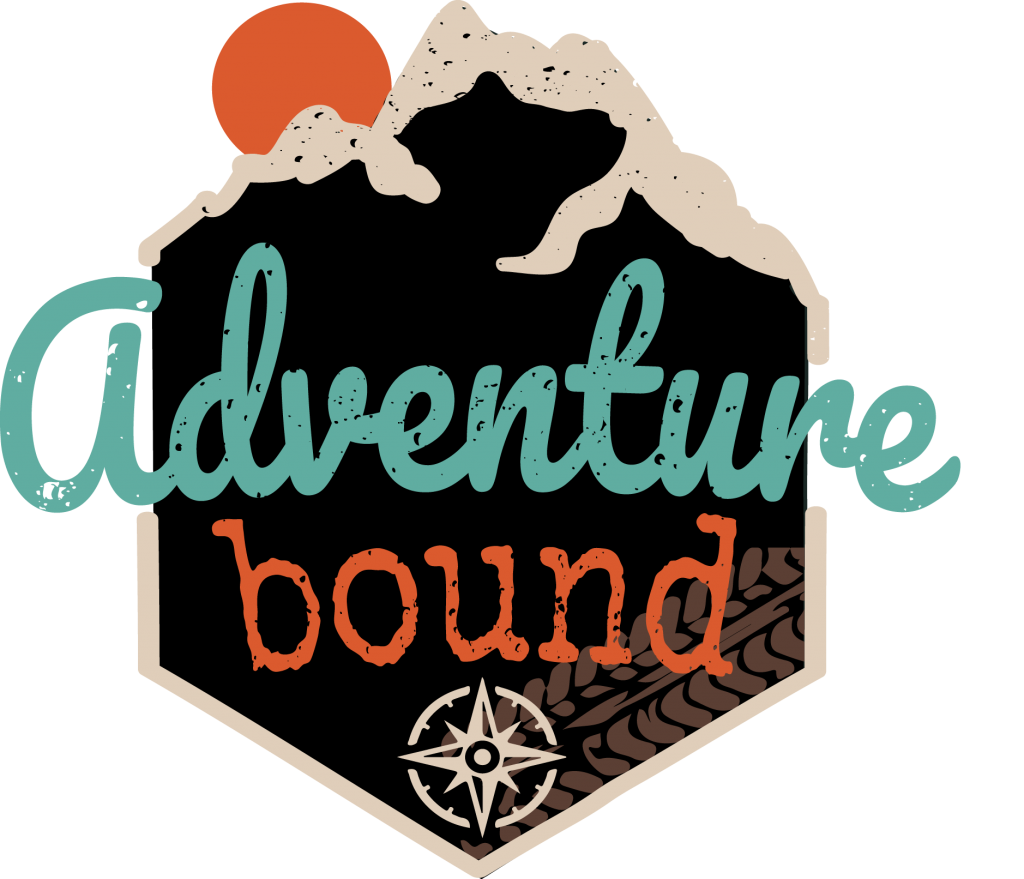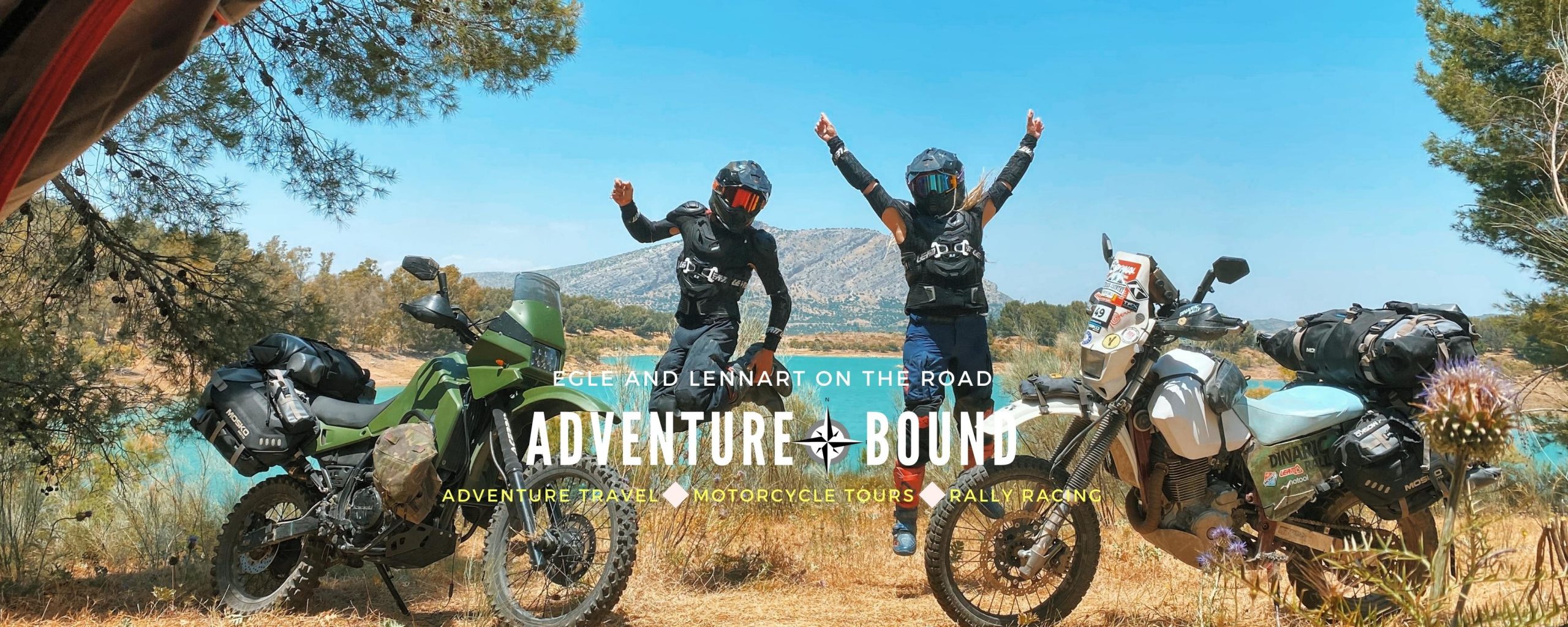When Russia invaded Ukraine in February this year, we were in the Netherlands, right amidst the Carnival celebrations. Soon after that, we were off to Central America to lead a motorcycle tour in Belize, then onto Mexico for a scouting mission, and finally, back to Europe for more two-wheeled shenanigans.
All the while, I’ve been living in a sort of paralysis, going through the motions as if in some surreal parallel universe. With time, the initial shock was replaced by numb horror following the news, talking online with my Ukrainian friends, and feeling utterly useless. The Ukraine war is personal for me – being from Lithuania, I’m all too familiar with the Soviet and Russian terror. I’m all too familiar with the maniacal imperial fantasies of Russia and its beastly machine of propaganda, terror, and ultimately, war, and although the warning signs were there all along from the Chechnya wars to Georgia in 2008 and Crimea in 2014, no one, including myself, ever believed there’d be a full-scale invasion. Not in the 21st century, surely.
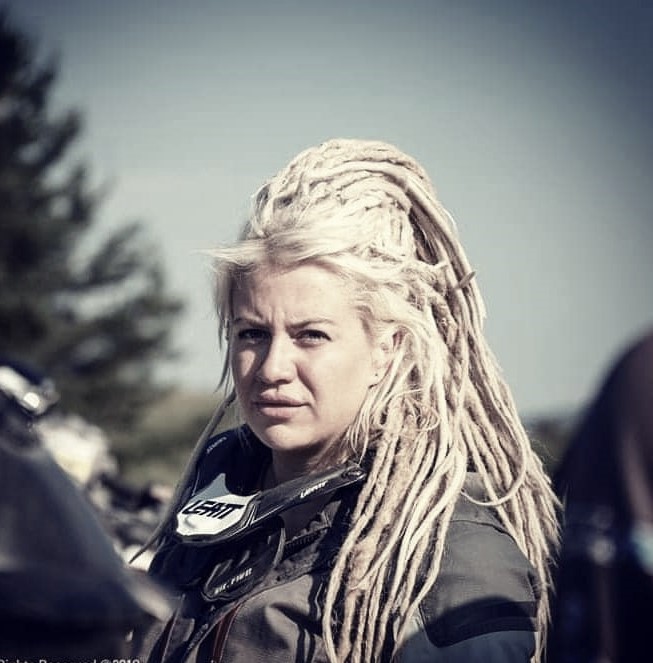
Yet here it was. I’d cried my eyes out more times than I can count, I’d felt helpless, powerless, useless, scared out of my wits, angry beyond what I thought possible, and the shadow of sheer terror was always nearby. Something we thought would never happen again was now tearing Ukraine apart, and I knew I had to find a way to help. I’d donated as much as I could to Blue/Yellow and various other NGOs – much like everyone else – but I wanted to make more of an impact if I could, wherever I could. The feeling of utter powerlessness is incapacitating, so I sought a way to act instead of giving in and watching helplessly from the sidelines. This paralysis wasn’t doing anyone any good, certainly not Ukraine, not me, and not my loved ones.
Project Ukraine: Delivering a Van of Supplies
Having connected with two Kyiv-based volunteers Daria Mitiuk and Mila Potapova of Save Ukraine NGO, I realized there was something I could do. Daria, a filmmaker turned crowdfunder, and Mila, an events manager turned full-time war volunteer, are two bright young women from Kyiv doing their absolute best to help people in need.
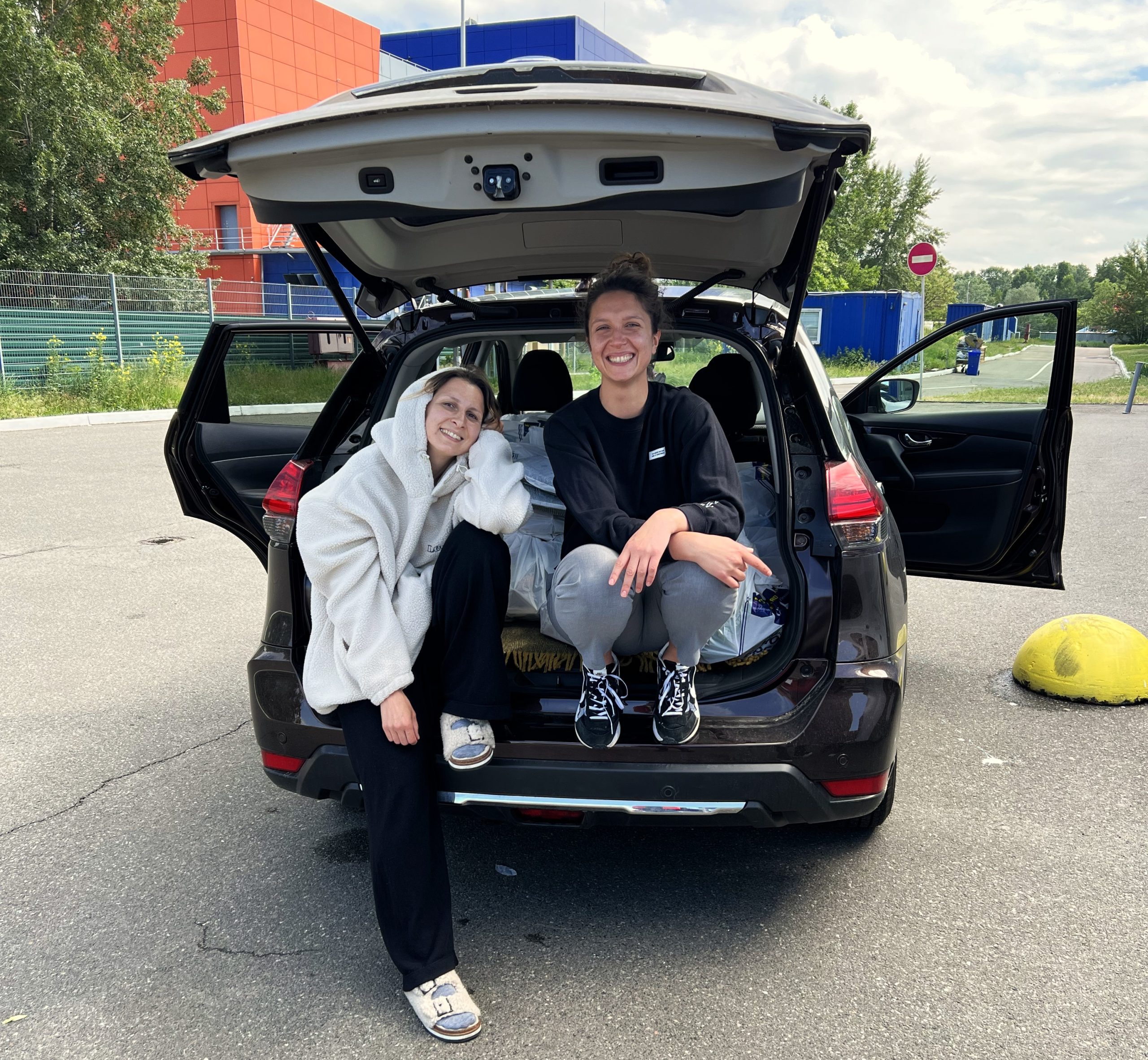
Visiting areas most affected by the occupation near Kyiv – villages of Irpin, Horenka, Borodyanka, Hostomel, and others (if you’ve heard of Bucha atrocities, you’ll know the destruction rate in those areas is around 80% leaving people without access to water, electricity, food, and basic amenities) – Daria, Mila, Oleksii, and other Save Ukraine volunteers deliver food packages, basic home supplies, hugs, and hope, and they’re also working to replace people’s windows and roofs before the fall so that at least some of the houses can be livable again. In addition, Mila and Oleksii are trying to rebuild a school in Horenka so kids can go back to classes come September.
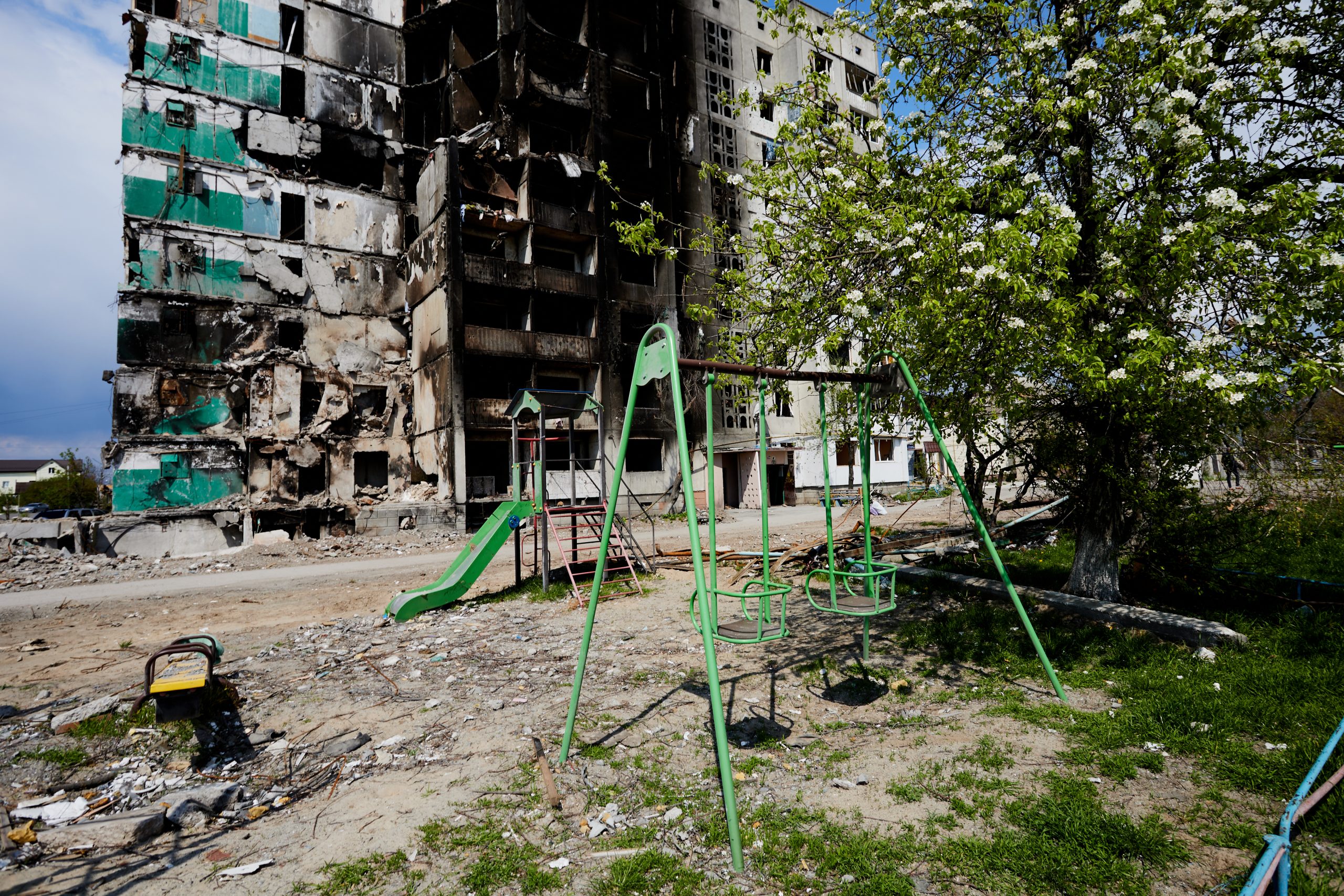
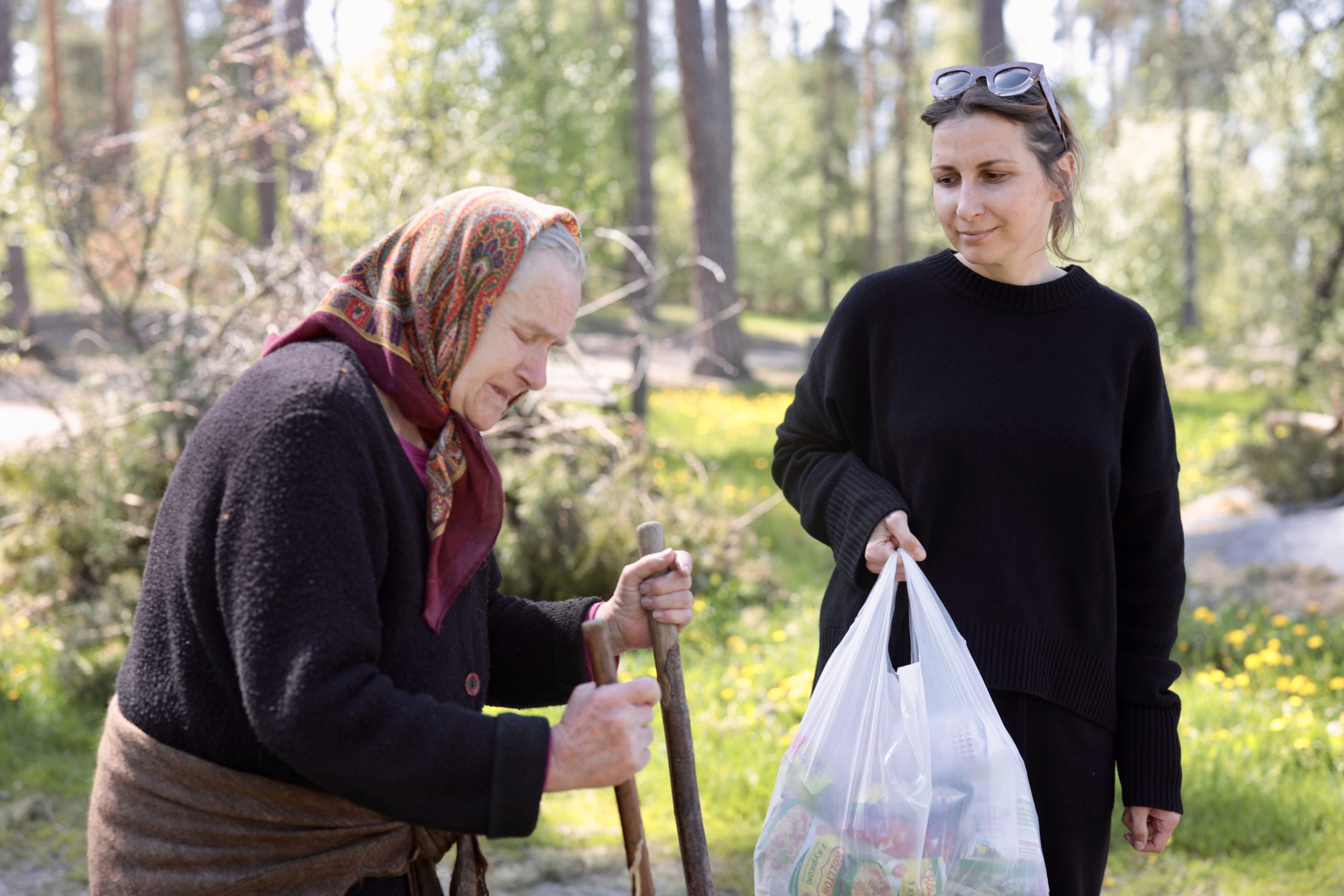
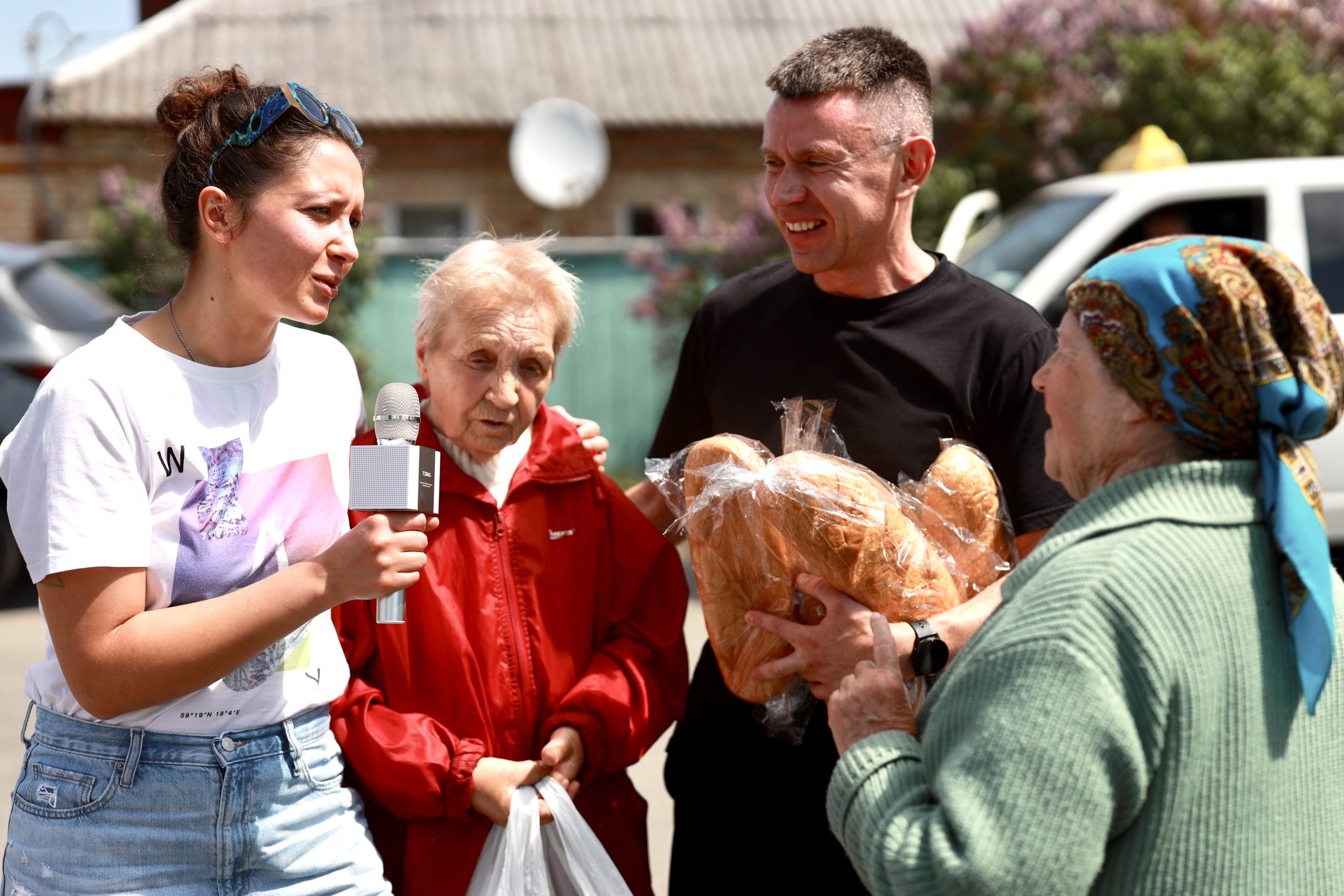
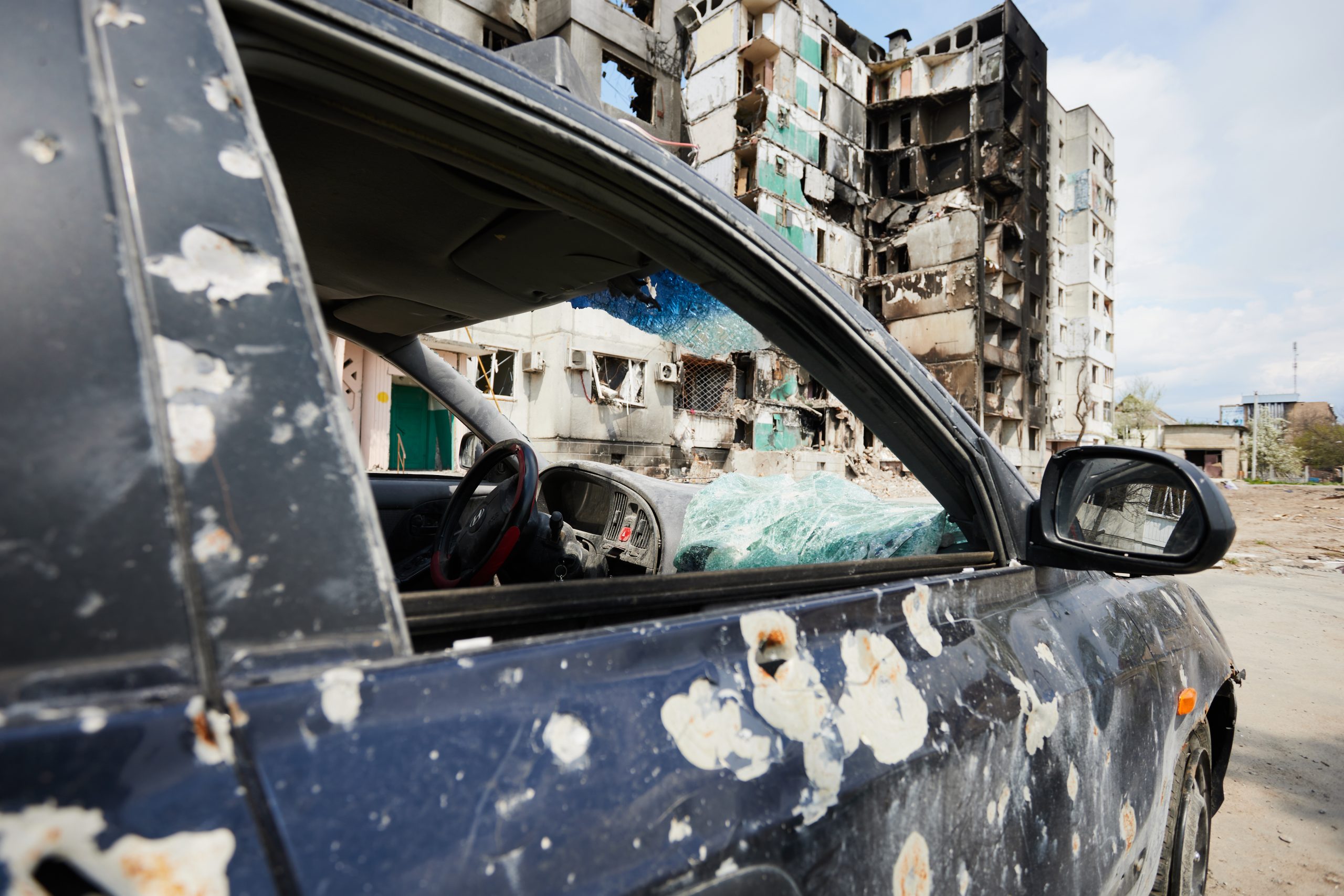
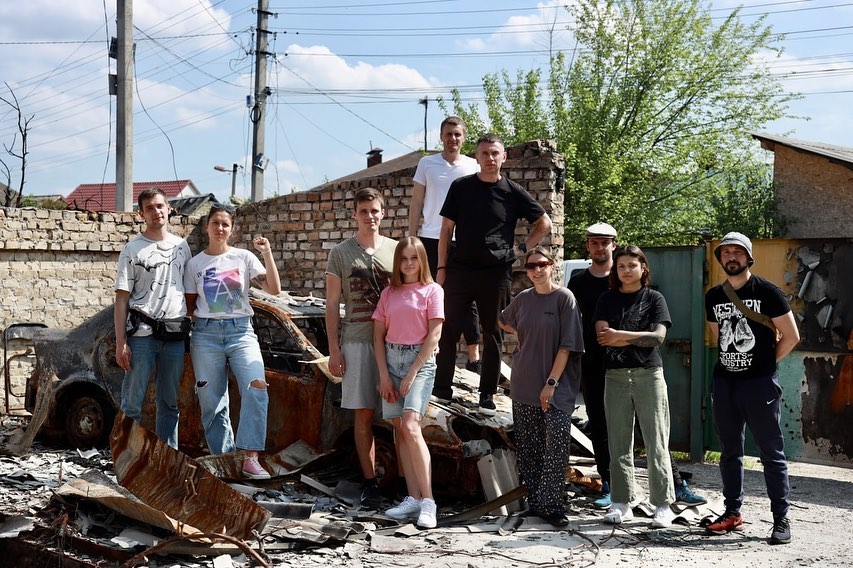
Could I help them?
Having talked some ideas over with Daria and Mila, I made a plan together with my dad Viktoras – a 72-year-old music history professor who was feeling exactly as I had felt: we would source a large cargo van, fill it with supplies, and deliver it to Ukraine to hand over the goods to Daria and Mila. We’d also fundraise as much as we could to contribute to the Horenka school reconstruction, and we’d create a short documentary of the journey to showcase what it’s like in wartime Ukraine right now. Soon, Lennart decided to join the project, too, and we began the prep.
First off, we needed to fundraise at least 5,000 euros to be able to buy the supplies Daria and Mila needed. They sent me a simple list of what was needed the most: food products like rice, pasta, canned veggies, meat, and fish, milk, cooking oil, salt and sugar, buckwheat… the very bare necessities, plus some home items like shampoo, soap, toothpaste, towels, and the like. Another request came from my moto-friend Irene in Lviv who was organizing blankets and bedding sets for a war refugee hostel in Kyiv – we would add duvets, blankets, and sheets to the list.
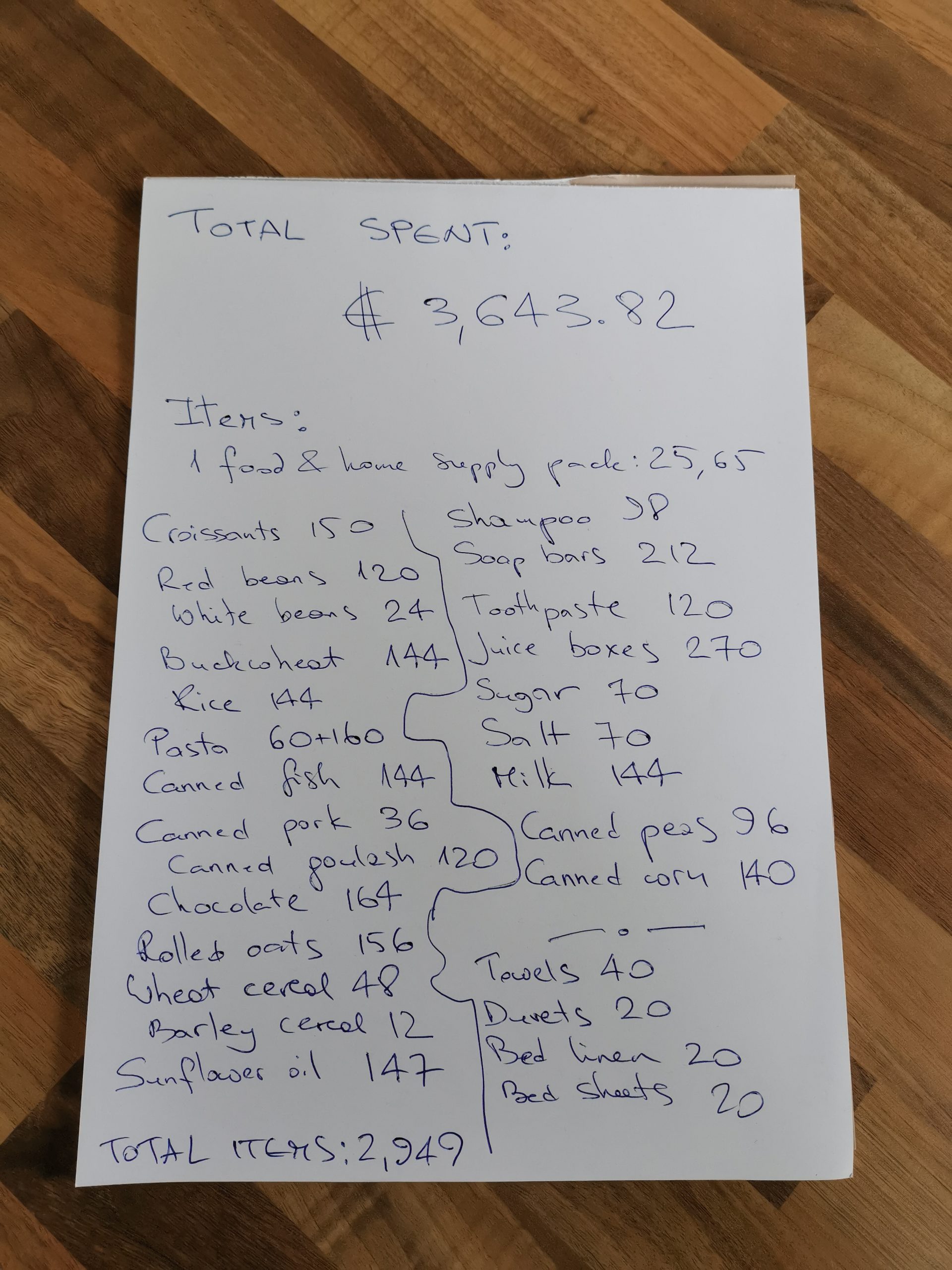
Next, we had to find a van. I imagined it would be easy – so many Lithuanians were doing similar runs to Ukraine delivering meds, pet food, blankets, clothing, and food products – but people who were already volunteering needed their own vans, and rental companies refused to help when they heard we were heading into Ukraine. Finally, I found a small truck and van rental company in Kaunas who said they’d done a few humanitarian aid runs themselves and were happy to offer us a Ford Transit. Score!
In just two weeks, we raised 6,309 euros from over a hundred wonderful souls on social media. Motorcycle riders, travelers, friends, friends of friends – thank you all who pitched in so, so much! Without you, this wouldn’t have been possible, and I so appreciate every single donation.
Finally, Lennart and I bought 1,5 tons of food and home supply products – 2,949 items in total – and spent two days loading up the van. We hoped we’d fill it to the ceiling, but, limited by weight, we only filled about half of it fearing the van couldn’t handle overloading. In the end, it turned out to be a good decision – we could transfer the remaining funds directly to Mila of Save Ukraine.
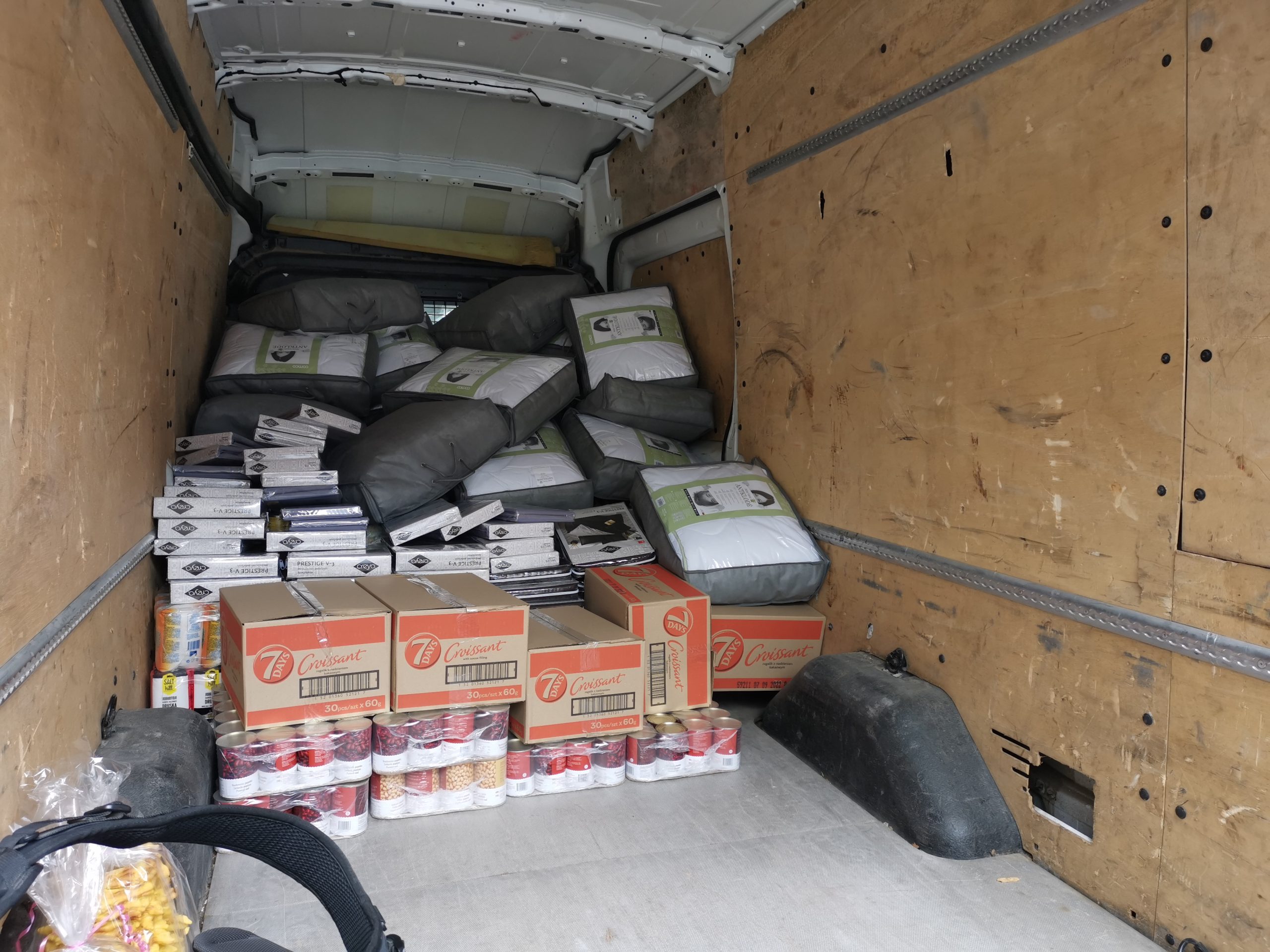
The Journey to Lviv
While initially, I planned to travel all the way to Kyiv, we decided we’d aim for Lviv instead where we’d meet up with Daria, Mila, and Oleksii, and hand the supplies over. Lviv was closer, and it seemed fairly safe at the time, plus we only had a short window of time before work called us back again.
On July 9, the van fully loaded, Lennart, my dad and I set off for Ukraine.
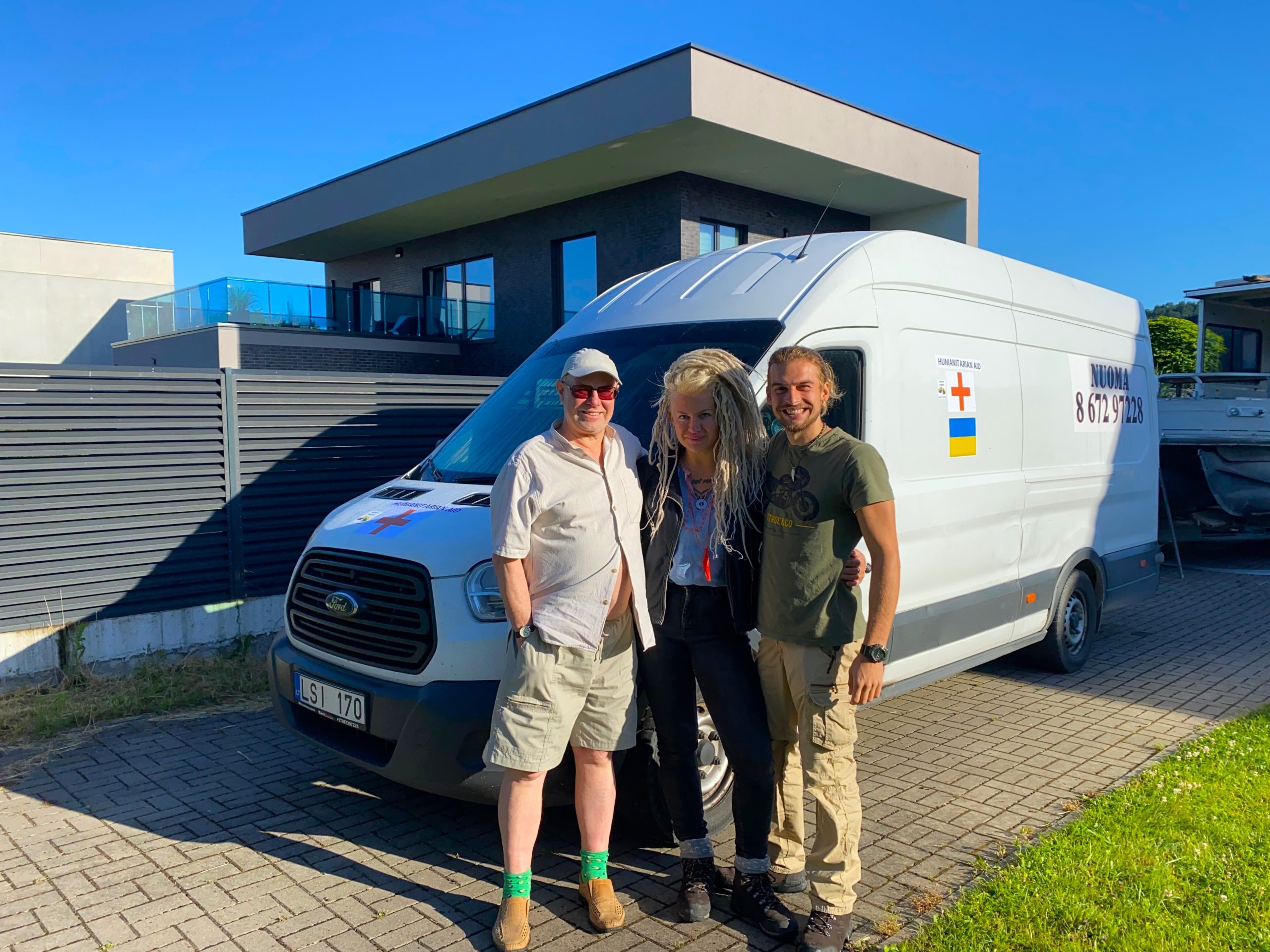
The journey across Poland was fairly uneventful, Lennart and me driving in shifts, dad observing the landscape and commenting on the state of cows in Poland (melancholic) versus Lithuania (dumbstruck). As we passed Lublin, we soon found ourselves drawing nearer to the Ukrainian border at Rava-Ruska. The first sign that something was amiss was long queues of trucks stuck on the side of the road. 30-kilometer-long queues lined the road, and we learned that because of the Black Sea blockade, most supplies now came into Ukraine via land, hence the insane lines.
We passed the trucks using the middle of the road, crossed the Polish border, and entered the Ukrainian side. Here, the border officers held automatic rifles, and we needed to declare our cargo – Mila had supplied us with the necessary paperwork of their NGO – and explain the purpose of our trip. My dad was the designated translator as neither Lennart nor I speak Ukrainian or Russian, but while the Ukrainian border guards were kind and friendly, they all pointed out Russian wasn’t their preferred language (my dad speaks it fluently because of the Soviet Union regime). We kept telling them we knew, we knew, oh, we knew… And I think, seeing the Lithuanian number plate, they felt we knew without words, and we got through the border procedures within a couple of hours.
Stopping at a gas station for a break, we had some fifty kilometers left to cover before entering Lviv.
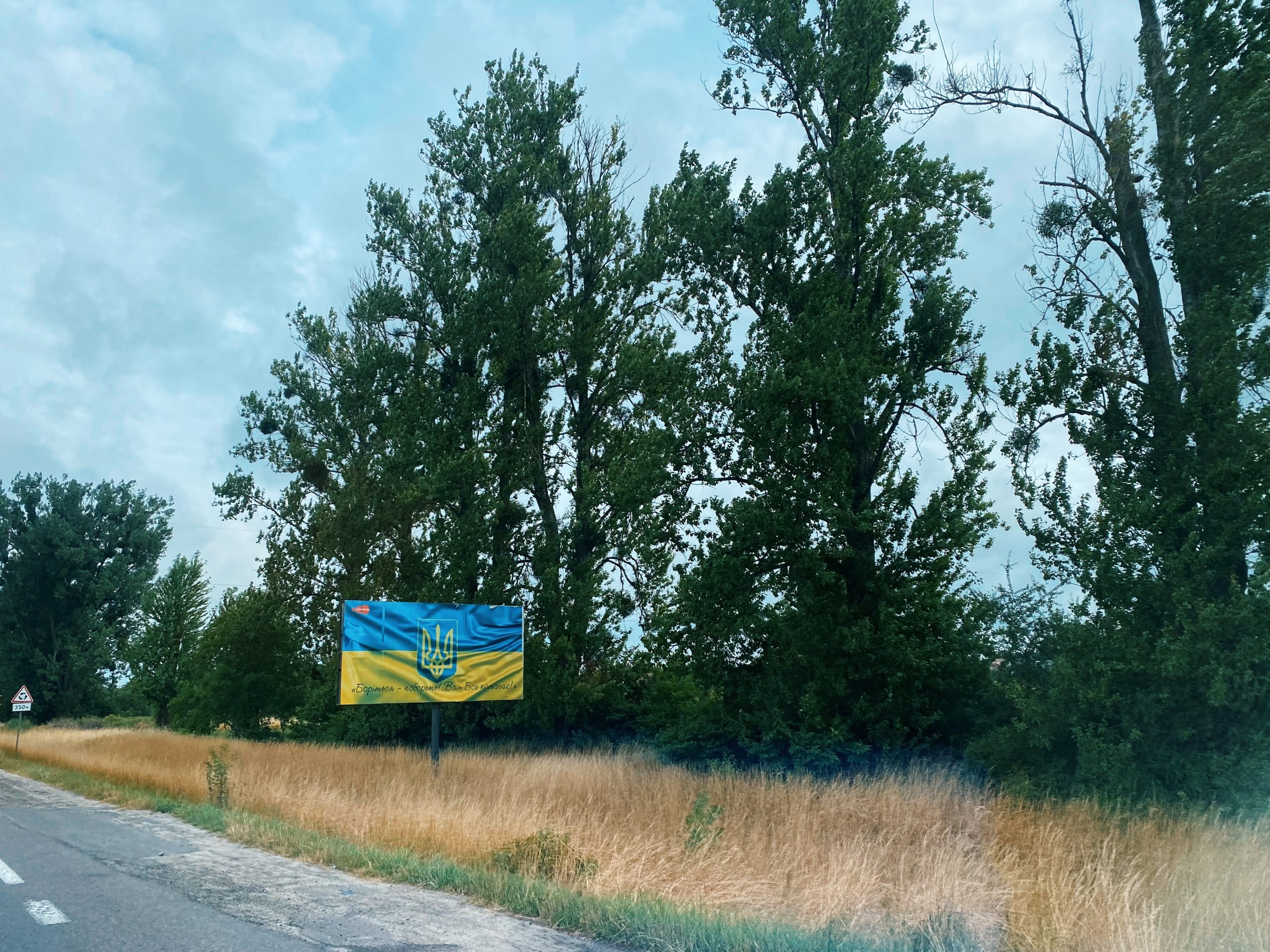
As we drove on, an eerie feeling descended on all of us. Seeing checkpoints with sandbags and “Czech hedgehogs” – steel beam anti-tank obstacles for defense – on side roads was a somber reminder that Ukraine was at war, right now, right this day, right this minute. We were stopped at one military checkpoint, checked over, and waved through; the most heartbreaking sight were fresh graves adorned with Ukrainian flags in a graveyard we passed – clearly, of those who died in the war…
Finally, we entered Lviv where the sandbags and steel “hedgehogs” marked the bigger streets and drove toward the city center to find our little hotel in the Old Town. Here, the atmosphere changed: Old Town Lviv is nothing short of stunning with countless old churches and courtyards, lofty Baroque mansions and buildings, cozy little alleyways dotted with restaurants, pubs, and craft beer places, and a vibe of a vibrant city – much like Vienna, Toulouse, or Zaragoza.
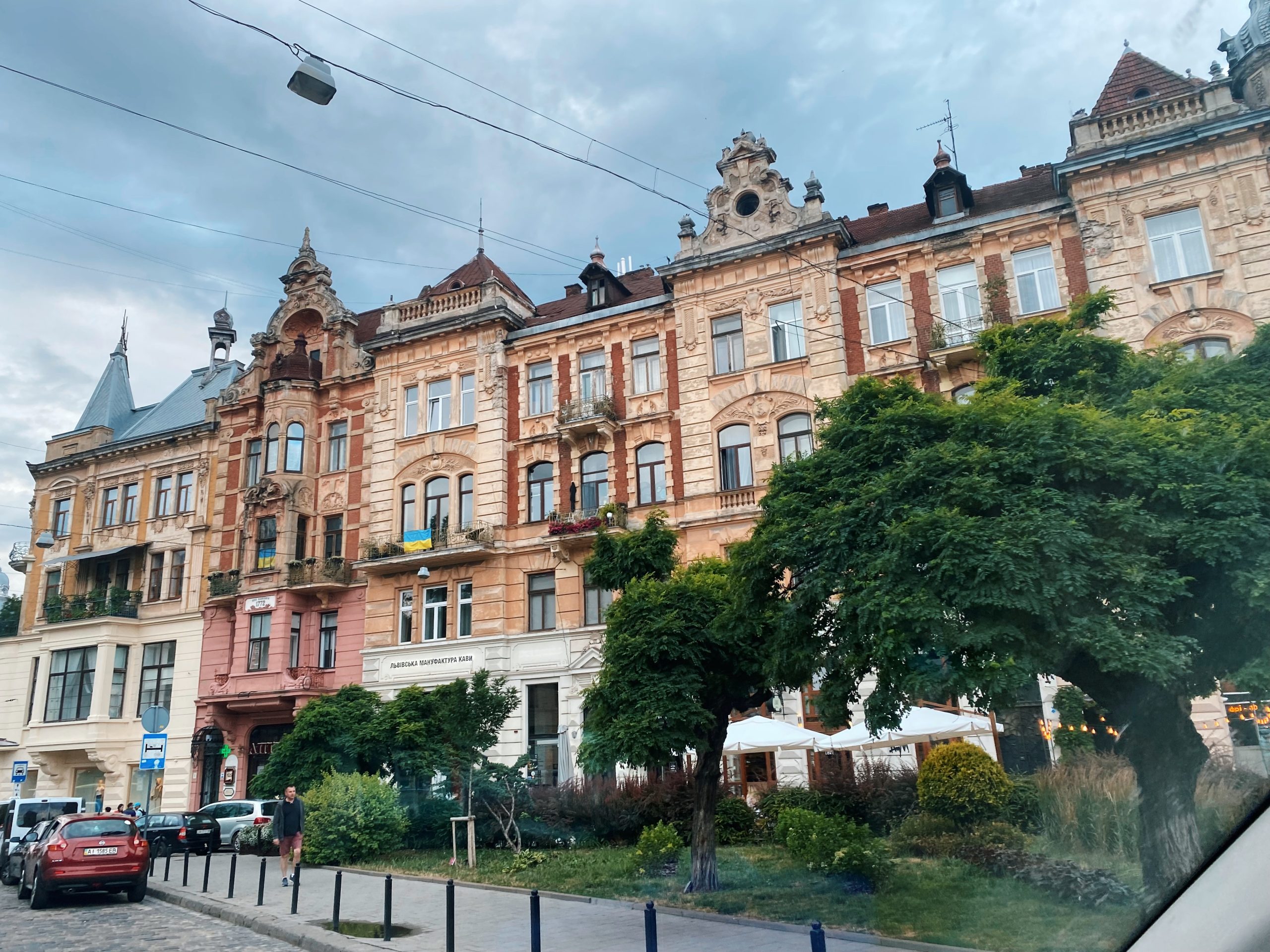
Venturing out for a late dinner, we ended up in a quirky Argentinean-style restaurant offering traditional Ukrainian food and craft beers, and suddenly, it felt like we were on a normal weekend outing in some peaceful, quirky, and beautiful European city. Except, of course, we weren’t…and were at the same time. It’s difficult to express that double-feeling, the atmosphere of utter surrealism when you’re enjoying a nice meal in town as heavy shelling rains down on huge swaths of the country and children die in shopping mall bombings just a thousand kilometers east.
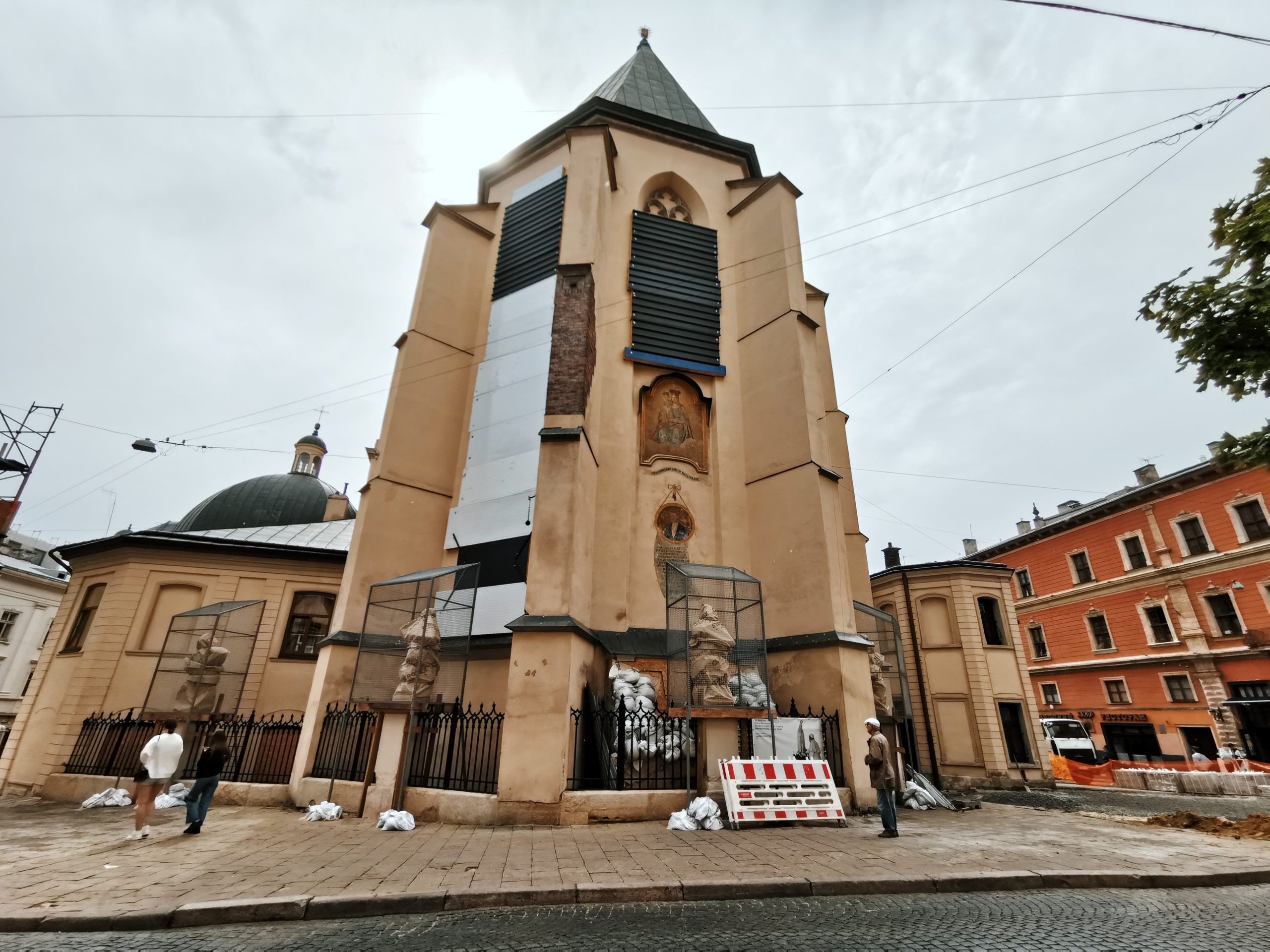
Ukraine, United
The next morning, we finally met Daria, her boyfriend Zhenia, Mila, and Oleksii. It’s hard to describe the emotional load of meeting these amazing young people – filmmakers, artists, event managers, mountaineers – all in their thirties, with their whole exciting life ahead of them, now aimed at one goal – helping out wherever they could while their loved ones fought in the front lines, fled the country, or volunteered themselves.
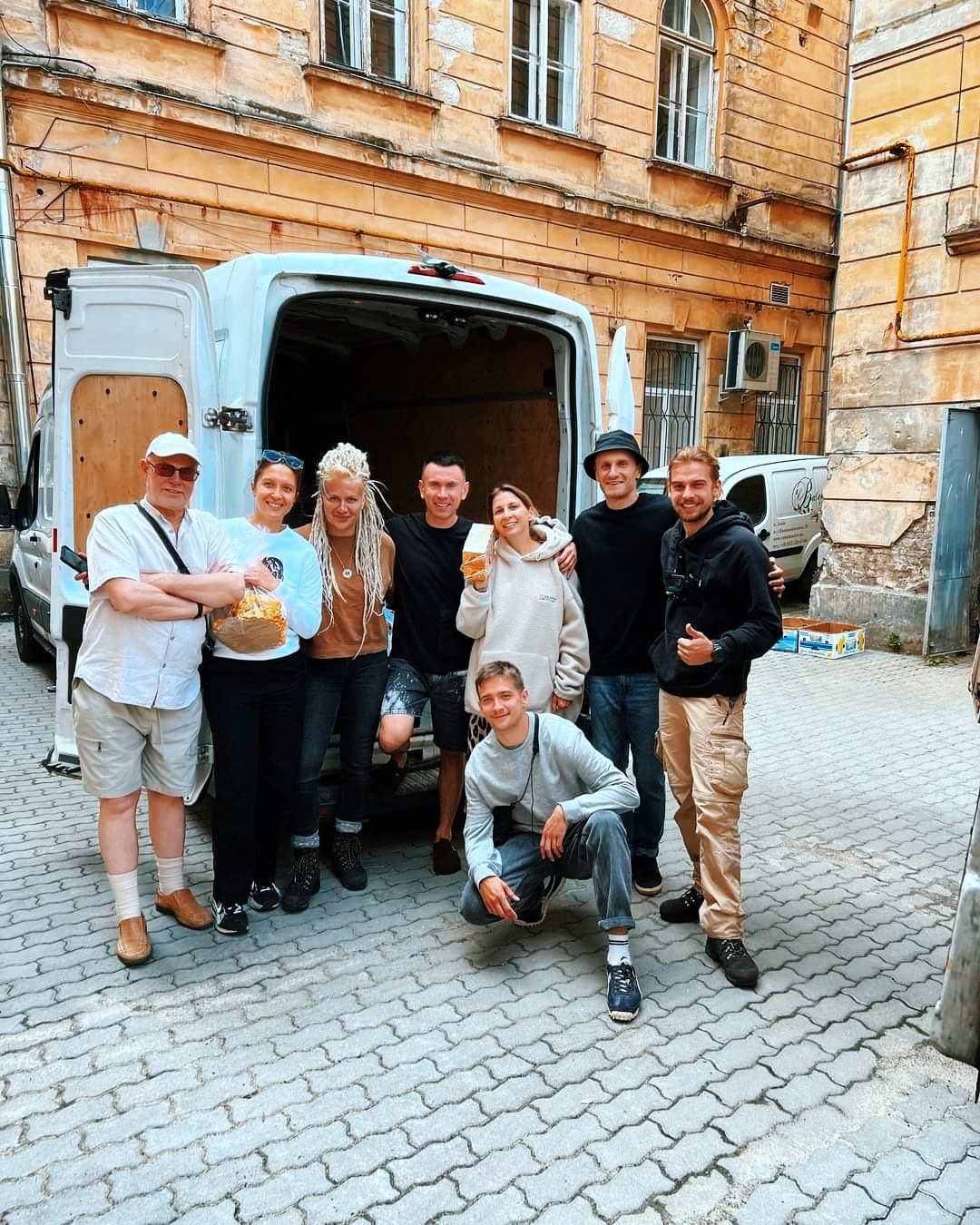
When I asked Mila why she’d stayed – as a bright young individual with a career in events management, she could have moved to any European capital and likely quickly found a job and a new life – she said she never even considered it. “When the war broke out and the initial shock wore off, my immediate reaction was, “what can I do?”. As Kyiv was being attacked, I started volunteering at military checkpoints – I would deliver hot meals to soldiers. Then, as the Russians were beaten back, I would venture out to surrounding areas to see how I could help. It all just sort of happened naturally, and besides, we all assumed this wouldn’t last longer than a couple of weeks”, Mila told me. As the war dragged on, her resolve to stay only strengthened.
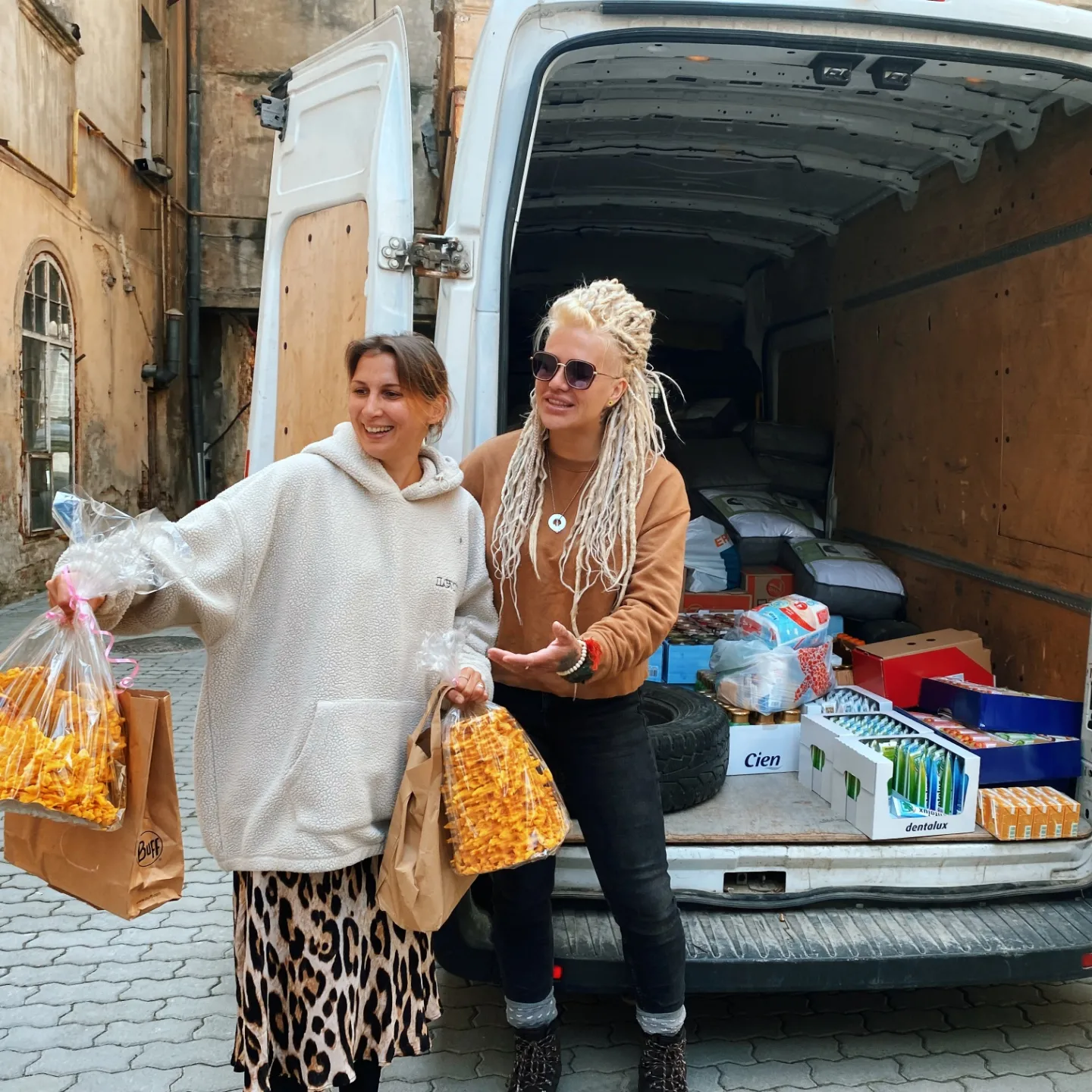
Daria’s story was similar. “I think, in the face of the war, every single one of us has to look into ourselves and find a way to act. In two years, in five years, when someone asks you, “what did you do during the war?”, how will you answer? For me, in the beginning, the answer was volunteering in a war kitchen in Kyiv. I worked non-stop, I barely slept. Then, I had to pause a little for my own mental health, but soon, I started looking for other ways to contribute. Mostly, I work with crowdfunding resources for the military as well as civilians”, Daria shared.
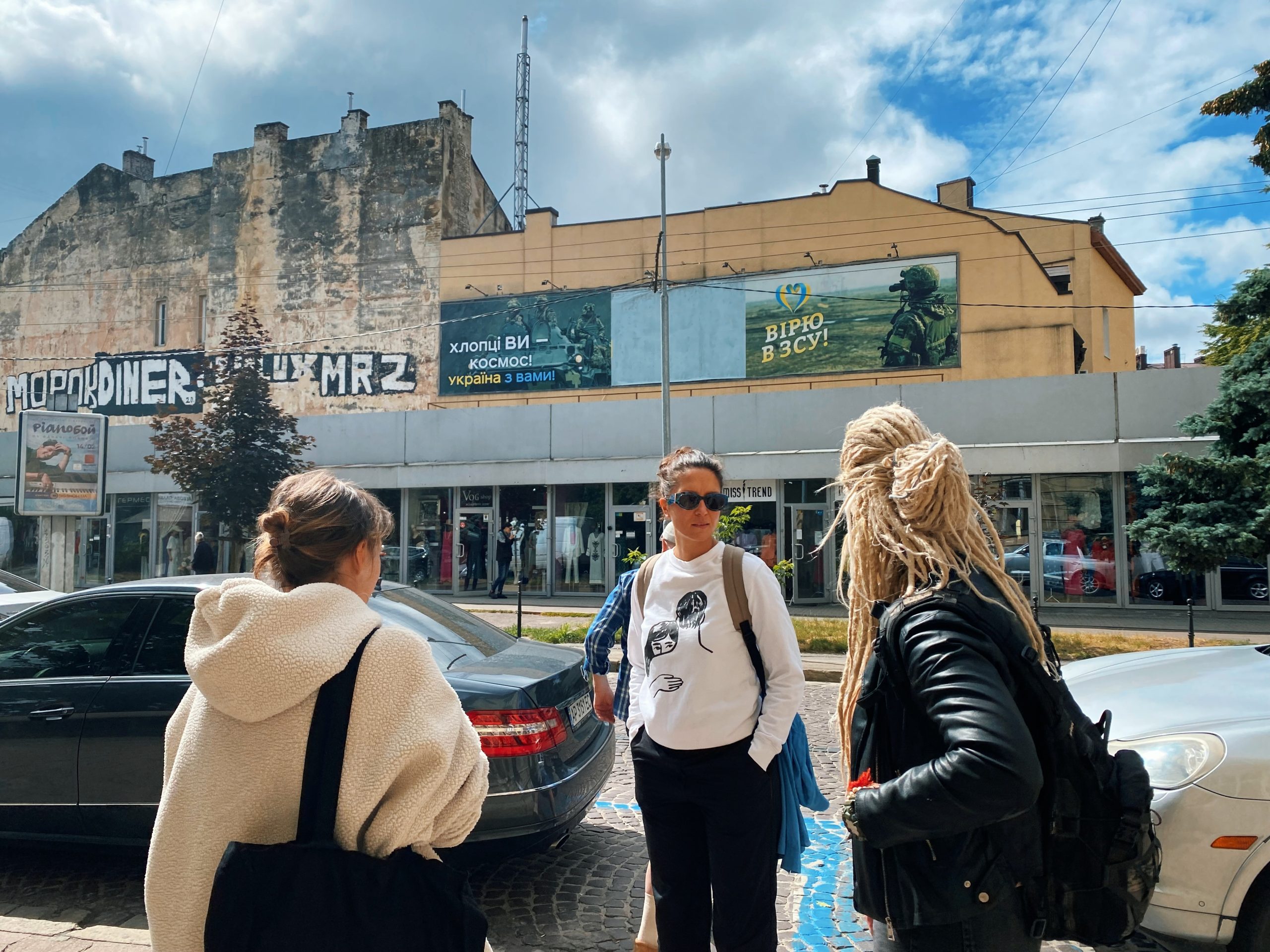
For her, the most heartbreaking thing about the war is the decimation of young Ukraine and the hopes they all had. “In the last few years, we all felt that Ukraine as a nation was heading somewhere. All of us in our late twenties and early thirties wanted to make art, make an impact, let our creativity run wild, work with cool projects – I was interested in eco-digital filmmaking – and we all felt that with our generation, Ukraine would change, it would grow; there was so much young, positive energy and we felt we’d all be swept up in it as our country transformed. Now, all that is taken away, all that is being pushed decades backward by this brutal invasion. It will take generations to rebuild, to heal, to forget the trauma. That, to me, is the most painful of all”, Daria said.
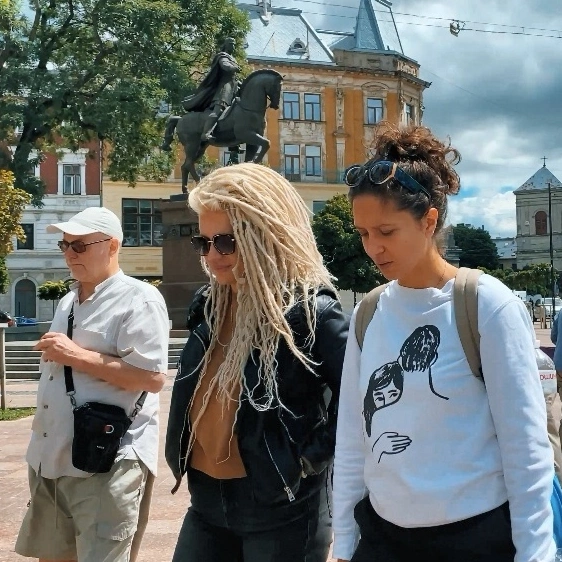
Still, they refuse to give up. “Honestly, I don’t have time for depression. Today, I learned there are three small kids in one of the villages we work in near Kyiv. Their mum had died the previous year, so the children are now with their grandmother, but the living conditions are very basic, the grandma only receives a 300-hrivna (about 20 euro) pension, and their dad… We haven’t found the words to tell them yet, but their dad isn’t coming back. He’s been shot by the Russians – we just received the confirmation… I have countless heartbreaking stories to tell, but I can’t allow those stories to sink me into depression. I have work to do. So that’s what I focus on – the work that can be done, here and now”, Mila told me.
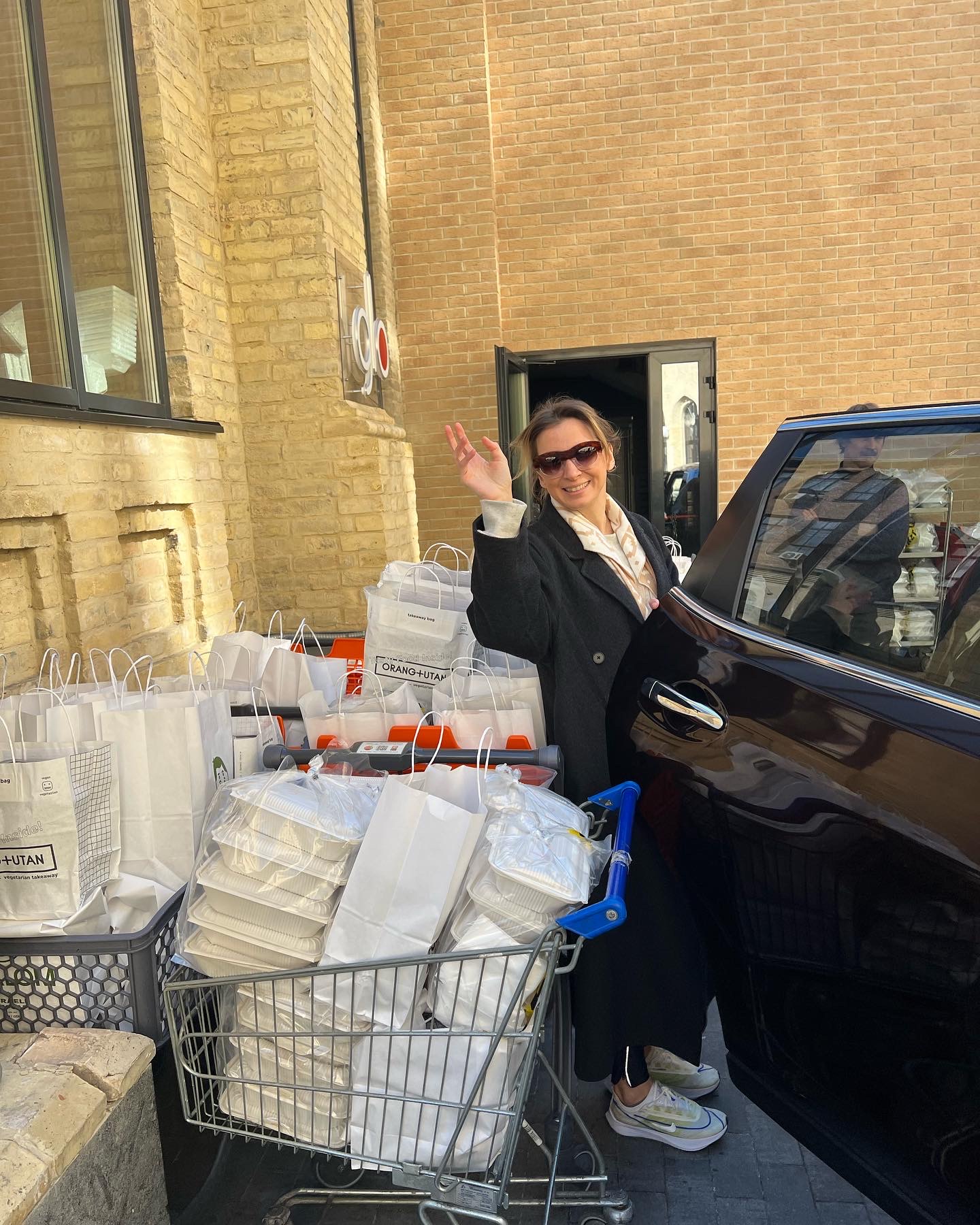
Her life is now comprised of 80% volunteer work, and what remains goes to her day job. Her social life and things like concerts, theatre, or hanging out with friends are on hold. Still, she smiles, she cracks jokes, and she gets on with it, just like Daria, Zhenia, Oleksii, and their team of volunteers.
And that, I think, is what touched us all the most: just how determined, focused, and united Ukrainians are right now. There are entire volunteering and crowdfunding networks all across the country, and we felt like we and our faithful Ford of supplies became part of a human chain that reacts, quickly and effectively, to where it’s needed most. Mila’s team unloaded our supplies into their own van and drove off to Kyiv the same day to be distributed; Irene’s friends picked up the duvets, blankets, and bedding for the refugee hostel and sent them off in the evening, all working quietly and effectively, all pitching in.
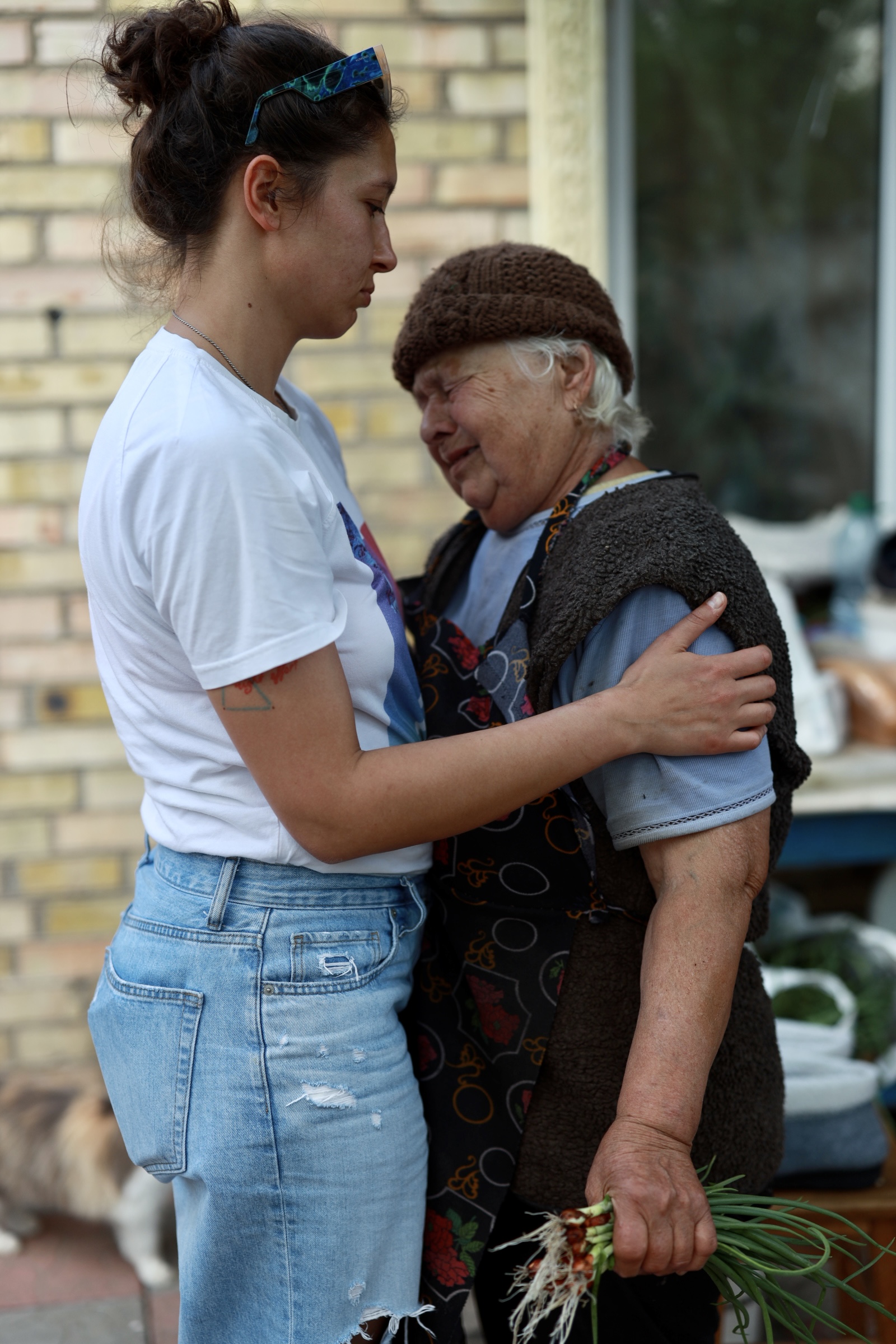
“Donating, collecting supplies, delivering them, stocking them, responding – it’s become like a national sport in Ukraine now. I don’t even know how businesses are making ends meet at this point – go to any coffee shop, and the proceeds will go to a cause; any concert, and ticket sales are donated to something; just about everyone is doing what they can – driving supplies if they have a car, collecting money, helping rebuild if they have the skills”, Daria told me, and we could see this with our own eyes. The Western donations may be dwindling, but Ukrainians are more united than ever, and Lviv felt like a beehive of activity, the networks reaching out to Kyiv – and to the front lines.
Our supplies already in Kyiv – and being distributed to those in need:
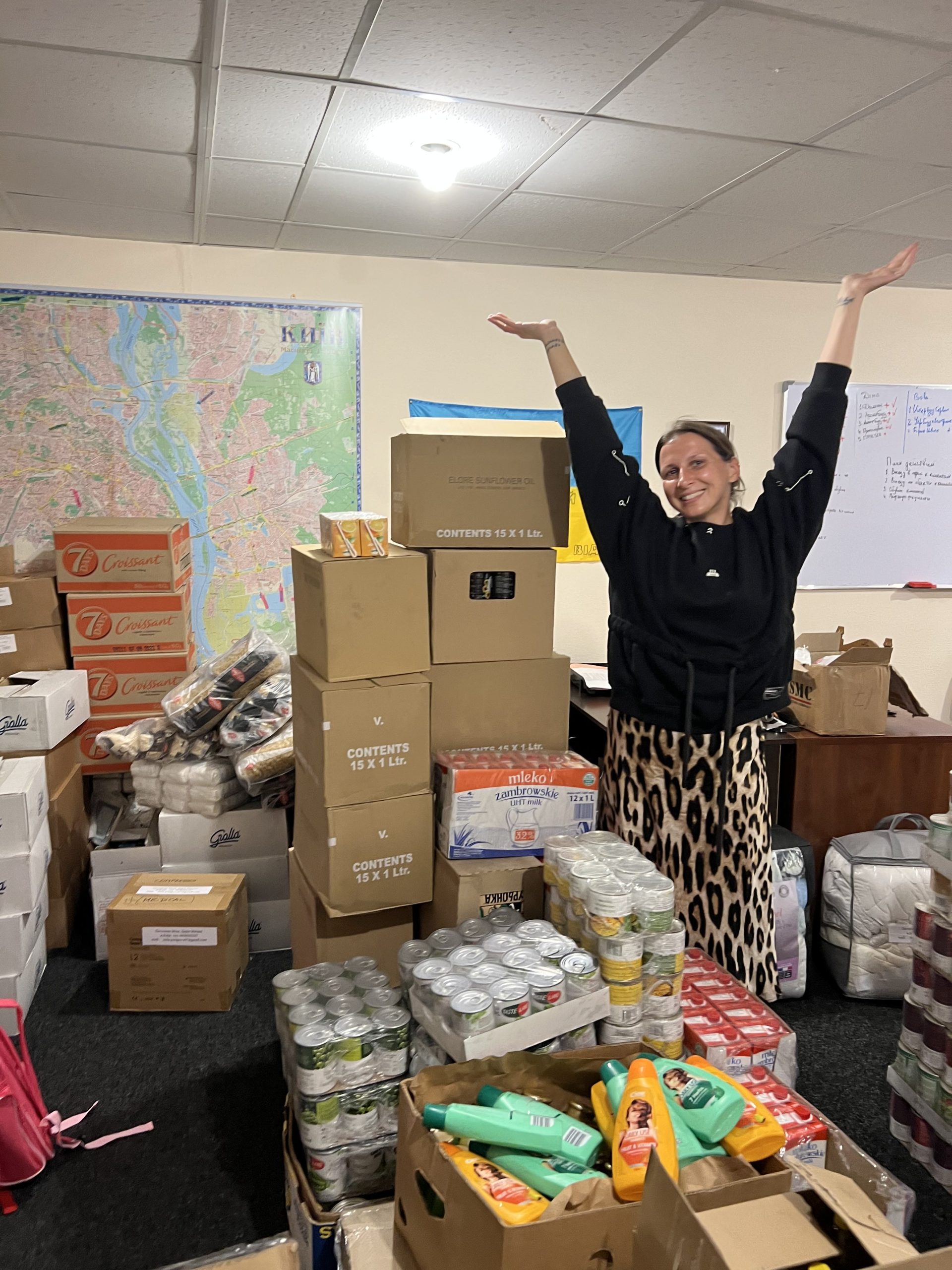
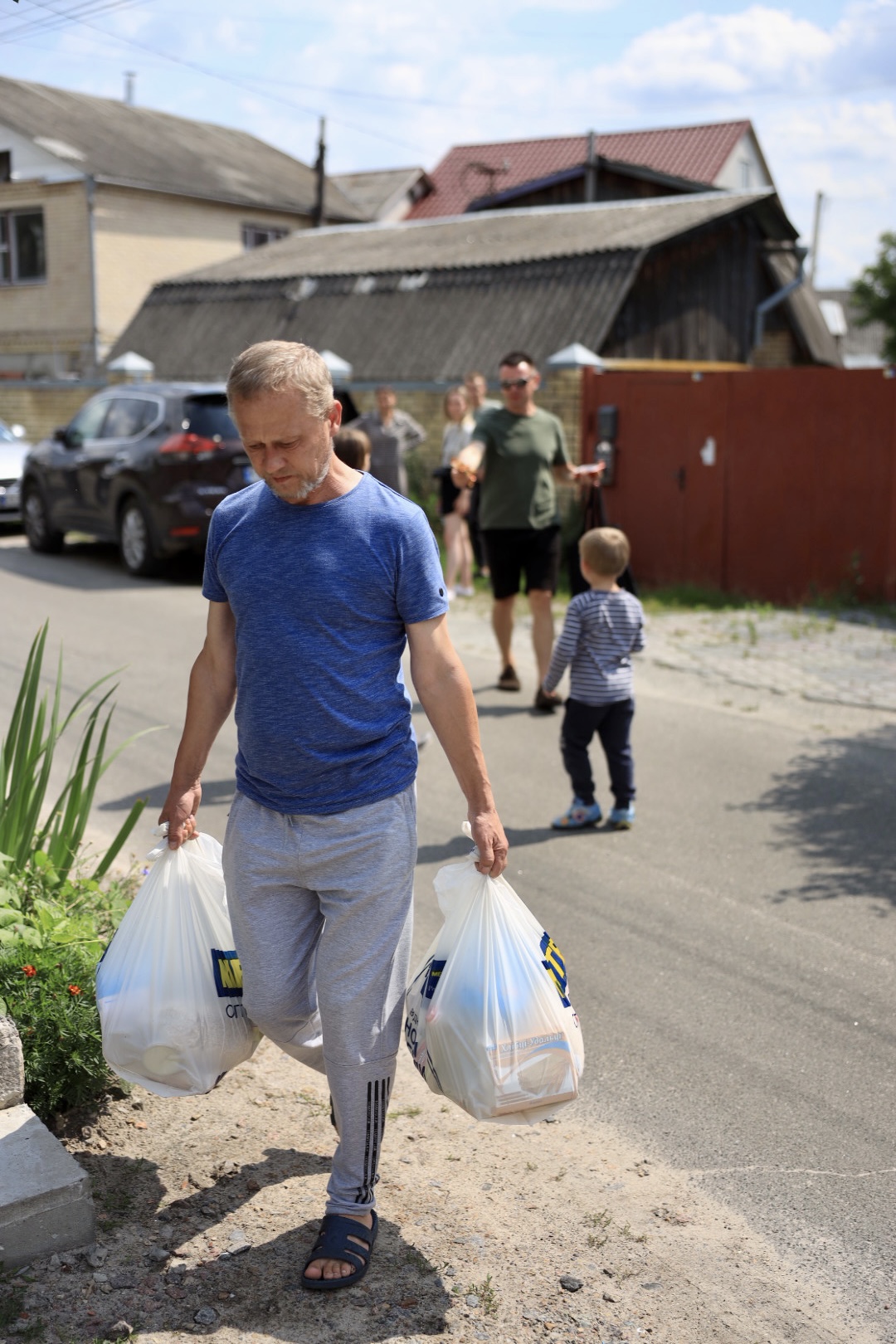
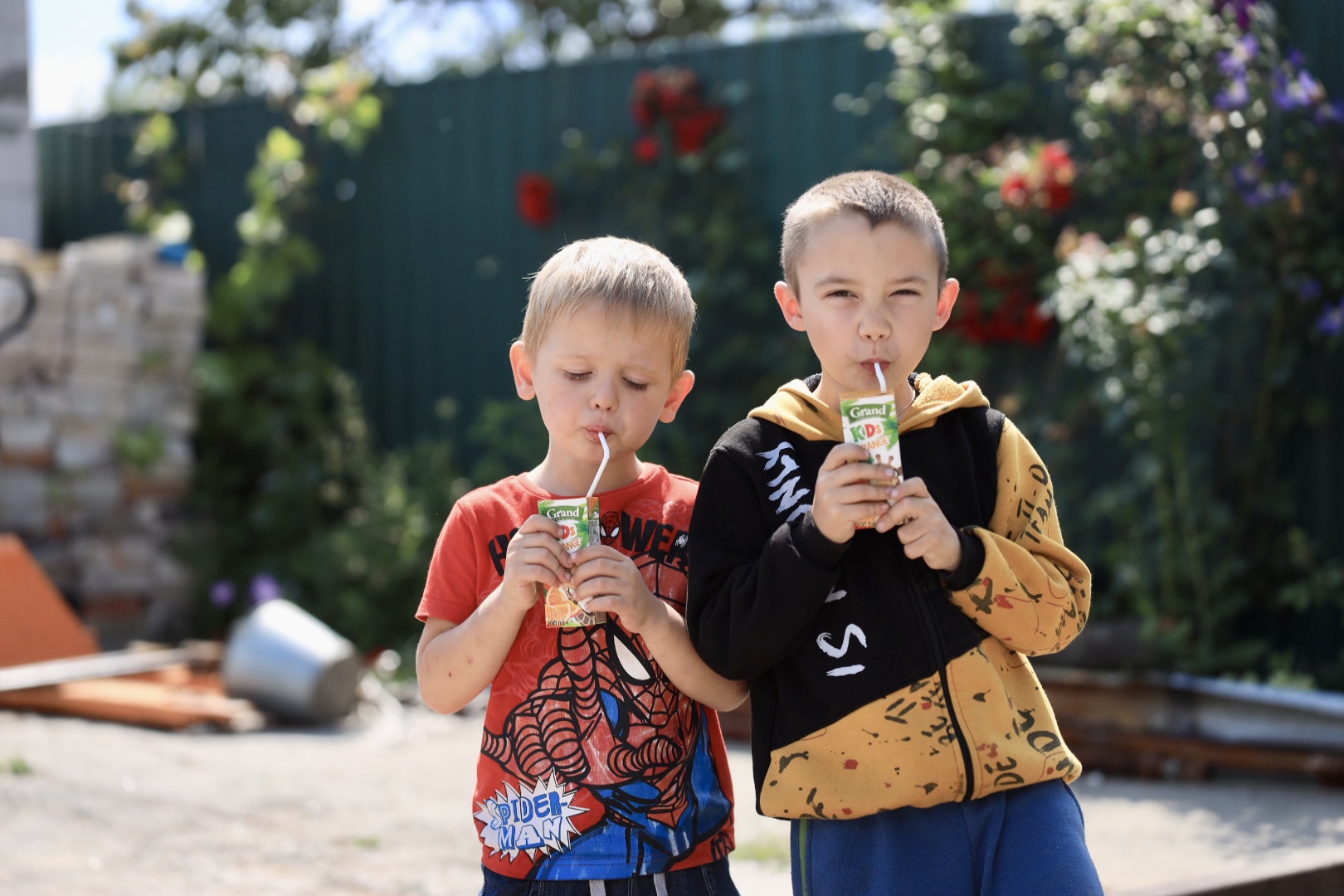
Air Raid Sirens in Lviv
After spending an incredible afternoon talking and exploring Lviv with Daria, Zhenia, Mila, and Oleksii, we felt privileged to have met these young people and added our own small drop in the ocean to their turbulent stream of organizing help. In the evening, I briefly met up with Irene, a digital artist and Lviv native; we chatted about the war, and a lot about things not connected with the war, like motorcycling around Europe and finding balance when you’re a freelancer, and the war again – she told me she couldn’t shake that same feeling of living in a surreal parallel world.
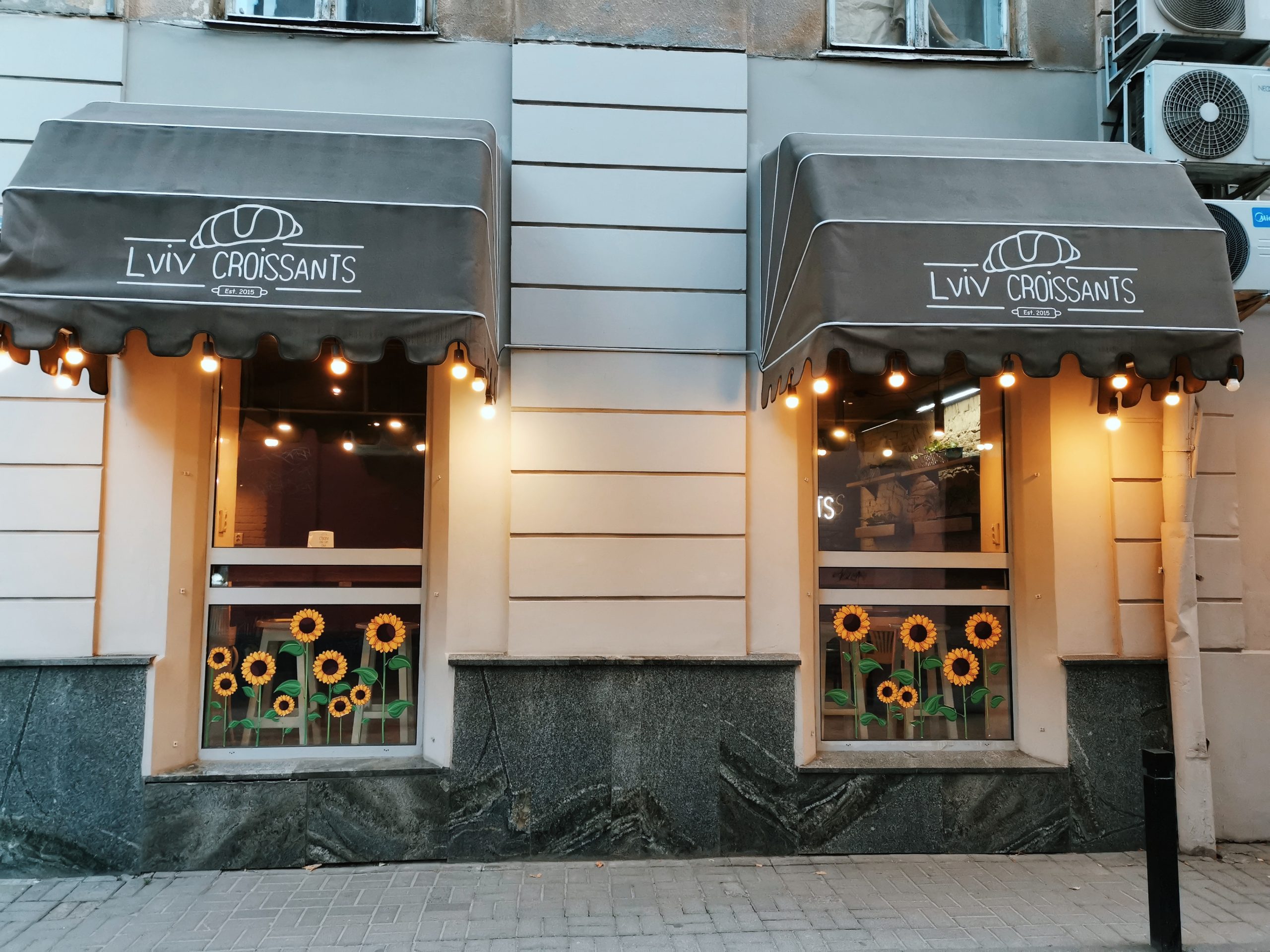
“I used to read books about war, and it blew my mind that people would still go out to eat and enjoy drinks and music; I would think, but surely you can’t do that if your country is at war? And now, we’re doing the same. We’re at war, but most shops, restaurants, and other businesses are open, we’re at war, but you can enjoy a craft beer in a pub, just like we’re doing right now… I still can’t wrap my head around it”, she told me. She and her partner were planning a long motorcycle journey to Italy or Greece this spring, but when the war began, they couldn’t leave. “It’s a claustrophobic feeling, like the walls are closing in”, Irene shared.
We had that exact same surreal feeling as we spent our last night in Lviv, talking, walking around, enjoying a traditional Ukrainian meal on a cozy Viennese terrace…all while observing old churches and statues being covered in sandbags and wraps to protect against blasts.
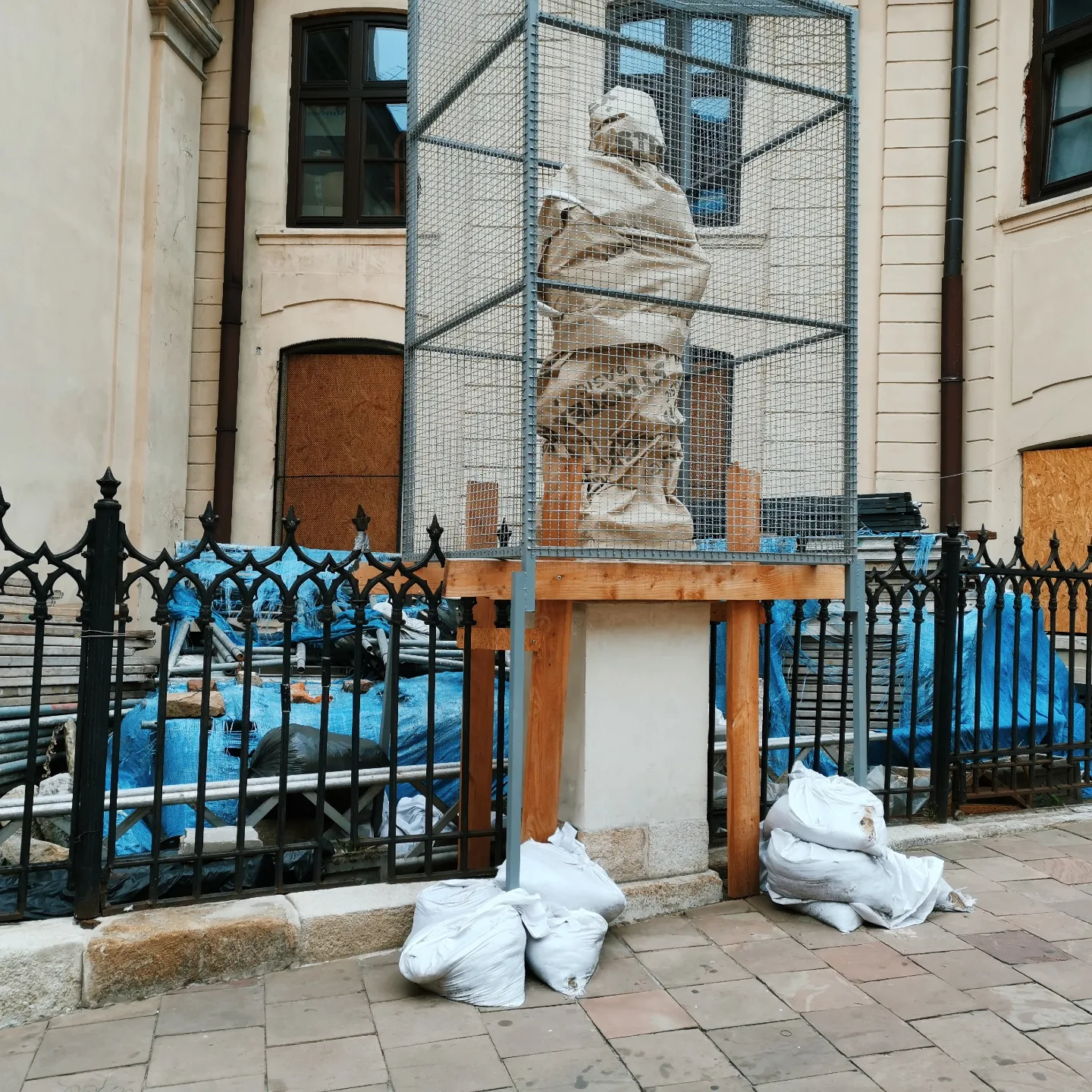
That night at 4am, there was an air raid siren in Lviv as Russians launched missiles from the Black Sea over the entire country.
We slept right through them.
“I guess that makes you a real Lviv resident now, then”, Irene shot me a text the next morning.
Our Ford now empty, we left Lviv at 9am heading back toward Poland. We were bringing back gifts: Mila and Oleksii gave us lovely T-shirts with a very simple message printed on them, one, I think, that translates the Ukrainian hope very clearly: the word “Independence” stamped on the front and an excerpt from their Constitution printed on the back. Irene gifted me the famous Snake Island post stamps and cards and a pair of socks with “F Russia” printed on them; her friends left us with a huge bag of chocolates, which Lennart shared with Ukrainian soldiers at the last checkpoint.
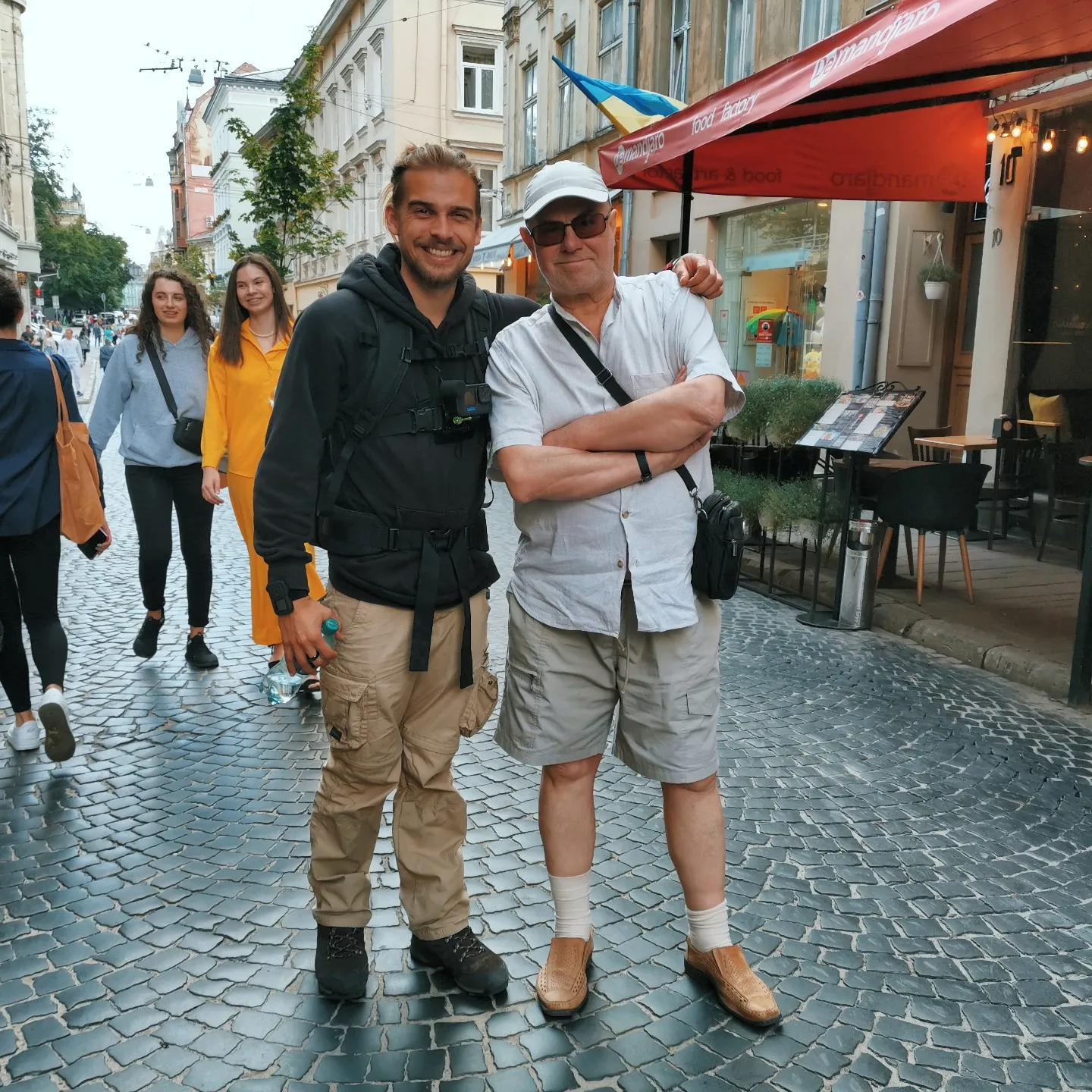
I had a strange lump in my throat leaving Lviv; all those small gifts from our Ukrainian friends were like tiny messages – of friendship, of hope, of a promise to see each other again, to stay in touch. “Next time, we’ll go to Odessa!”, Mila said as we hugged goodbye. My dad had always wanted to see the Odessa Opera House.
Odessa has been under heavy shelling just days ago.
Crossing the border back was easier with an empty van, and soon, we were making our way back to Lithuania. Heavy rainclouds kept on our heels, and crossing Poland, we drove through thunderstorms and darkening skies.
Never Forget
Now, typing up this post, I still don’t know how to feel about the whole thing. For one, I’m overwhelmed by gratitude: to all of you who donated and helped make it happen; to Daria, Mila, Zhenia, Oleksii, and Irene for meeting up with us, sharing their stories, and letting us be a small part of what they do; for Ukraine, fighting a bloody battle for us all – because, make no mistake, this isn’t just about a few Eastern territories Putin is after; for life itself, made a thousand more times more precious by what we’ve seen in Ukraine.
But most of all, I hope to create some sort of a continuum and keep helping. This will not be over soon, and thousands more will die before the shadow of terror from Russia is defeated. You may feel tired and numb, you may choose to ignore the news of the war, you may be preoccupied with your own troubles right now, and that’s understandable; or you may feel, like I did, completely useless and powerless, you may think you can’t possibly make a difference; but whatever your circumstances are, they are far, far better than those of the Ukrainians fighting for their very existence and freedom right now. Against all odds, they fight, against all odds, they refuse to surrender, and against all odds, they are standing tall. Don’t forget them, don’t let your governments abandon them, and don’t think for one moment they aren’t fighting for you, too.
Slava Ukraini – and let’s stand together, until victory.
Expense Report – and How You Can Help, Too
In total, we raised 6,309 euros with the help of over a hundred people from Europe, North America, and Australia. To buy the food and home supply products, we spent 3,644 euros, and we transferred the remaining 2,665 euros directly to Mila so she and her team can use the funds to rebuild the Horenka school:
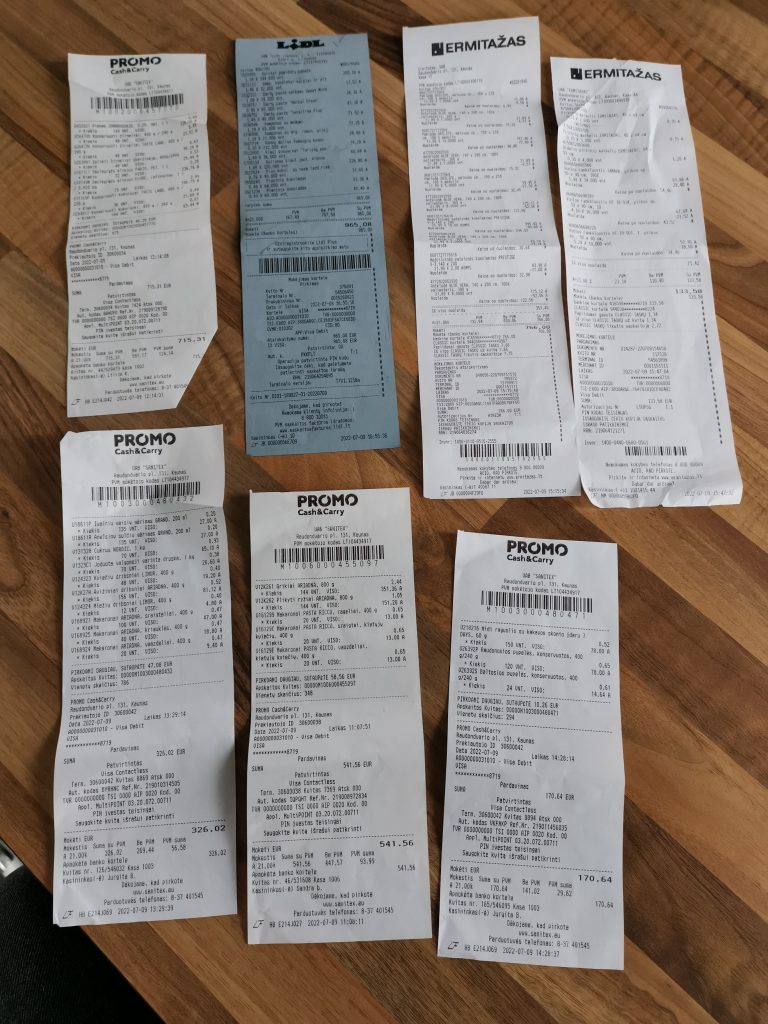
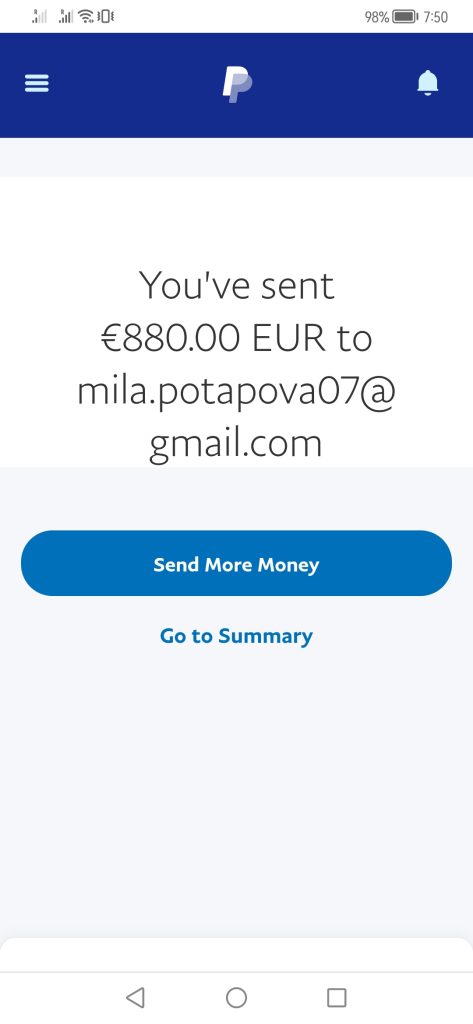
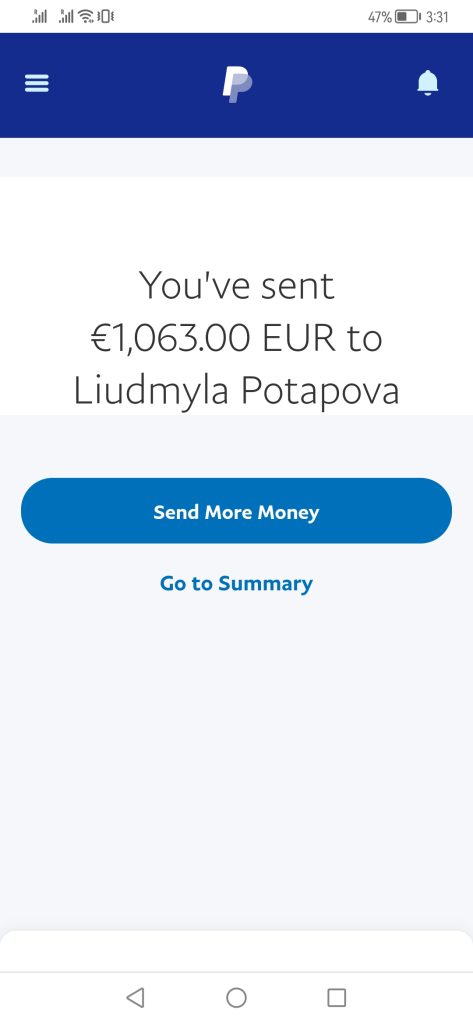
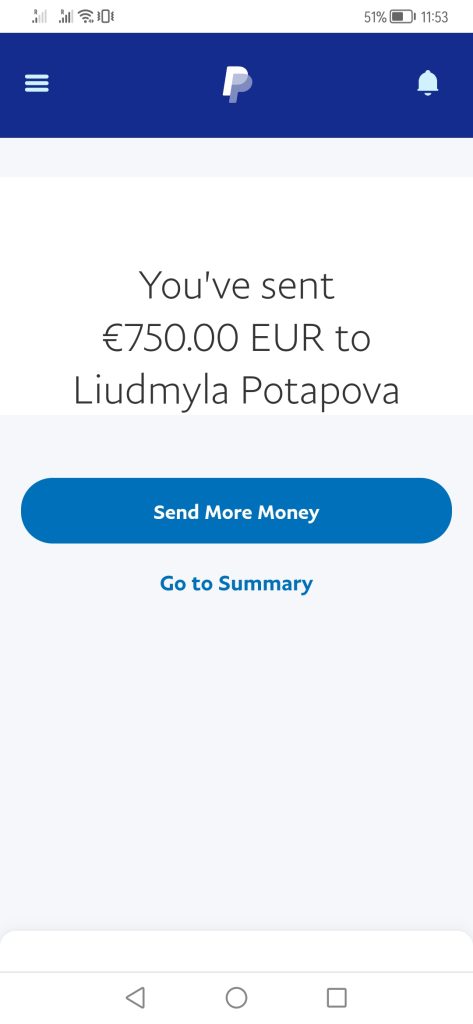
There still are a few donations being processed by Stripe, amounting to about a hundred euros, which I’ll send to Mila directly once it hits my account.
The van rental, fuel, and our travel expenses were covered by my dad and ourselves.
If you would like to help Ukraine, here is what you can do:
- Don’t forget! Don’t get “tired” of the war – trust me, Ukrainians are a hell of a lot more tired of it than we are, but we have no right to turn away now. Stay informed, keep pressuring your governments to act, keep demanding harsher sanctions and more decisive response to Russia.
- Support Ukrainians. Buy Ukrainian art and products on Etsy, do ghost bookings in Ukraine on AirBnB, reach out to Ukrainian volunteers and influencers personally, help Ukrainian refugees in your own country.
- Personally donate or fundraise to your preferred NGOs, or better yet, directly to Save Ukraine – the NGO Mila and Oleksii work with:
FOR DONATIONS IN FOREIGN CURRENCY (USD):
Organization name: “NGO SAVE UKRAINE”
IBAN: UA983052990000026002046223819
BANK: JSC CB “PRIVATBANK”, 1D HRUSHEVSKOHO STR., KYIV, 01001, UKRAINE
SWIFT code: PBANUA2X
Correspondent bank: JP Morgan Chase Bank, New York, USA
SWIFT code: CHASUS33
Account: 001-1-000080
PAYPAL
mila.potapova07@gmail.com
CRYPTO WALLETS:
BTC
Copy
bc1qg8ypek8ta5m7xxm3pgjlthy4g5rd8ts5thw0ju
USDT (TRC20)
Copy
TKMBTq7vwXZkKSA6izAJ1B5qDx2ChvKwhZ
ETH
Copy
0x402331378d36194f3a545Cc3375240ffd7EB0c0D
- Travel to Ukraine yourself and deliver supplies or volunteer. Crossing the Polish-Ukrainian border is not difficult at all, and Lviv is a fairly safe city where you can do some good. Plenty of my friends travel as far as Kyiv, Chernihiv, and other areas to help out and do so safely and successfully.
